#Yeah fuck it‚ let's put it in the tag.
Text
Went with my coworkers to watch the Barbie movie. Mega spoilers below. What I can say without spoilers is that this is a movie you should watch with friends/acquaintances, but a full theater could substitute. I had fun.
The good:
I was laughing so much and so was our teen intern and a lot of other people in the theater.
The props and costumes!
Margo Robbie!!!!!
The... disappointing? The negative criticisms:
So many truths were dropped as jokes and it was funny and well-paced but for a movie that is constantly talking about how bad the patriarchy is... it doesn't grapple with it or seem to have anything to say? Which isn't surprising because I knew going into it it was basically an ad for a toyline, but I didn't expect so many explicit call outs of systemic and structural misogyny, which is why I'm left wishing there had been a point the film was trying to make. It's like everything was lampshaded and never analyzed.
The set up, given by a voice-of-god narrator, is that in Barbieland the Barbies think misogyny is solved in the real world because of them. And then the ending has the protagonist, Stereotypical Barbie, saying she wants to be one of the people shaping the ideas, not one of the dolls shaped by those ideas. It turns out Gloria had been shaping her, by dreaming up Cellulite Barbie and Constantly Thinking About Death Barbie (I forget the exact phrase the movie used) and Sad Barbie. You would think this would be the plot of the movie. This is what caused Stereotypical Barbie's malfunctioning, what ignited the call to adventure. This is what Barbie's last big decision was about. You would be wrong (we'll get there). Maybe I'm just spoiled by Discworld (and something else did this too... ugh I can't remember) but like, the interplay of belief between humans and their gods? How they both shape and form each other? That is my absolute jam and they could have done so much with it and they seemed like they were going to! And they technically did something with it but like, I dunno, to me it felt like the something they did do was deserving of a 22 minute episode in a 26 episode season, not a full theatrical movie with a star-studded cast. Oh no, in the real world the toys got weird. The plot in the toy world wasn't even caused directly by human beliefs but rather by a toy's belief.
Okay there's nothing in the movie to contradict asexual!Barbie so that's great but uh, now that it's out I don't want to keep seeing ace!Ken jokes/implications that this is actual real representation because uh...
...the plot is that Ken is an incel.
Seriously.
He has a song about how it sucks to be in the Friendzone.
He brings patriarchy to Barbieland and brainwashes all the other Barbies to be subservient to Kens because he loved that in the real world he was finally given the time of day.
For a bit I was worried that the movie would try and pull a "misandry is just as bad as misogyny" thing because he did kinda have 1 valid complaint in the beginning, but thankfully it didn't.
Anyways I know there are ace people who genuinely like kissing, but I don't think a character who makes multiple unwanted advances to the same character is like, innately representation. Even if he does lack genitalia.
On a related note, with spoilers for the very last moment pre-credits, I don't know how I feel about the only action we see Barbie take as a human rather than a doll is attending a gynecologist appointment. Like on one hand it was funny, and gynecologists are treated as women's doctors by society. On the other hand, the implication that being a Real Woman means having a vagina is bad. Like yes one of the Barbies is played by a trans actress, but I didn't catch anything in the movie to imply that she's a trans Barbie, you know? Like if I was watching this unaware of the internet hullabaloo, nothing in the movie would have clued me into the creators knowing that gender isn't something fixed and predetermined. Which I feel is relevant when they made a move all about gender, the patriarchy, and how humans imagine and conceptualize the world!
Related to the second bullet, Gloria has a proto-goth daughter (who unfortunately does get pinkafied) and it is absolutely clear said daughter gets some of her rage at the unfairness of the world from Gloria. And Gloria has been drawing all these Sad Barbies, which Sasha thinks is actually cool and dark. But when Sasha pushes Gloria to present her ideas to her boss, what comes out it Ordinary Barbie, who could or could not be a mom and could or could not be the president. Like I get that the point is that sadness, overwhelming thoughts of death, and cellulite are all normal, but the way Ordinary Barbie was pitched makes it really easy for the doll to be identical to Stereotypical Barbie as a toy.
They didn't deal with death at all! Like, they acknowledged that humans die and barbies don't but this was all undermined by having a human ghost in multiple emotional scenes! They dealt neither with actual death, nor how unfounded fears of others' death can make people scared and sad (huge root of my depression) or how fears of one's own death can make someone obsessed with legacy and leaving a mark (seems rather relevant for a Barbie movie with many explicit call backs to the entire history of Barbie, and for a movie that says it's about imagination and conceptualization).
I don't really know what the Executives were supposed to bring to the movie. Like, soon enough the pacing absolutely removed them from feeling like an actual threat. And they were.... cartoonish is the wrong word. They felt like they were from Barbieland, not from the Real World. I feel like they were useful for one joke about how lol, Barbie is about girlpower but all the people in charge are cis white men.
The movie makes gay men the butt of jokes and nothing more, and absolutely nothing indicated to me that they know gay women exist.
This should be higher up but like starting a few weeks (months?) ago the press for the movie made me worry that it was going to be too much about Ken and like, yeah, I was right. The plot isn't Barbie vs. The Real World. The plot is Barbie vs. Ken.
Well this wasn't supposed to get so long and I fell asleep while writing it but uh, ¯\_(ツ)_/¯, yeah. This movie is like the opposite of Nope in the way that when I left that theater with my siblings and dad and cousins we were analyzing nonstop about what things meant and symbolized and all that, and then the next day we had even more to say. Since then I think the only other movie I've seen in theaters has been SM:AtSV with my dad and siblings and like, okay we didn't leave the theaters theorizing but we did leave talking about how good it was (and then my siblings started talking about MCU's Spider-Man and Doctor Strange and I kinda tuned out). Vs when I left the theaters with four of my coworkers, we clearly had fun but like, there wasn't much more to say.
Like I watched Nimona by myself the other week, yeah? (Well okay, my parents came home three quarters of the way through but even though my mom was in the living room she wasn't watching the movie.) And I think that was a good use of my time and I enjoyed it, as evidenced by going through the tags on Tumblr and reblogging art and analysis. But if I had watched the Barbie movie by myself, and not in a half-full theater eager to laugh with my coworkers including one making a bunch of comments to me and some guy behind me making a bunch of comments to his friend, I think I might have felt a little emoty at the end. Like, the experience was fun but I don't think I got anything from the movie. Metaphorical potato chips/sugar candy if you will, where it tastes nice in your mouth but doesn't fuel you in either the short term or the long term.
I did have fun! But if you were expecting something more than an ad and a laugh, this is not it.
#personal#liveblogging stories#thoughts#Oh my goodness this got SO LONG.#Barbie#Yeah fuck it‚ let's put it in the tag.
6 notes
·
View notes
Text
Double Indemnity, Veritas Ratio and Aventurine

This was originally a part of my compilation post as a short analysis on the Double Indemnity references, linking to this great thread by Manya on Twitter. However, I've recently watched the movie and found that the parallels run much deeper than just the mission name and the light cone itself, plus as the short synopsis I've read online. Since there isn't really an in-depth attempt at an analysis on the film in relation to the way Aventurine and Ratio present themselves throughout Penacony, I thought I'd take a stab at doing just that. I will also be bringing up things from Manya's thread as well as another thread that has some extra points.
Disclaimer that I... don't do analyses very often. Or write, in general — I'm someone who likes to illustrate their thoughts (in the artistic sense) more than write. There's just something about these two that makes me want to rip into them so badly, so here we are. If there's anything you'd like to add or correct me on, feel free to let me know in the replies or reblogs, or asks. This ended up being a rather extensive deep dive into the movie and its influences on the pairing, so please keep that in mind when pressing Read More.
There are two distinct layers on display in Ratio and Aventurine's relationship throughout Penacony, which are references to the two most important relationships in the movie — where they act like they hate/don’t know each other, and where they trust each other.
SPOILER WARNING for the entire movie, by the way. You can watch the film for free here on archive.org, as well as follow along with the screenplay here. I will also be taking dialogue and such from the screenplay, and cite quotes from the original novel in its own dedicated section. SPOILER WARNING for the Cat Among Pigeons Trailblaze mission, as well.

CONTENT WARNING FOR MENTIONS OF SUICIDE. YOU HAVE BEEN WARNED.
To start, Double Indemnity (1944) is a film noir by Billy Wilder (and co-written by Raymond Chandler) based on the novel of the same name by James M. Cain (1927). There are stark differences between the movie adaptation and the original novel which I will get into later on in this post, albeit in a smaller section, as this analysis is mainly focused on the movie adaptation. I will talk about the basics (summaries for the movie and the game, specifically the Penacony mission in tandem with Ratio and Aventurine) before diving into the character and scene parallels, among other things.

—
[THE NAME]
The term "double indemnity" is a clause in which if there’s a case of accidental death of a statistically rare variety, the insurance company has to pay out multiple of the original amount. This excludes deaths by murder, suicide, gross negligence, and natural causes.

The part of the mission in Cat Among Pigeons where Ratio and Aventurine meet with Sunday is named after the movie. And before we get further into things, let's get this part out of the way: The Chinese name used in the mission is the CN title of the movie, so there's no liberties taken with the localization — this makes it clear that it’s a nod to the movie and not localization doing its own thing like with the mission name for Heaven Is A Place On Earth (EN) / This Side of Paradise (人间天堂) (CN).

—
[SUMMARY OF THE 1944 MOVIE]
Here I summarised the important parts that will eventually be relevant in the analysis related to the game.

Insurance salesman Walter Neff, wounded from a gunshot, enters his office and confesses his crime on a dictaphone to his boss Barton Keyes, the claims manager. Much earlier, he had met Phyllis Dietrichson, the wife of Mr. Dietrichson and former nurse. Neff had initially wanted to meet Mr. Dietrichson because of car insurance. Phyllis claims her husband is mean to her and that his life insurance goes to his daughter Lola. With Neff seduced by Phyllis, they eventually brew up a scheme to murder Mr. Dietrichson in such a way that they activate the "double indemnity" clause, and the plan goes off almost perfectly. Initially, the death is labeled a suicide by the president of the company, Norton.
Keyes finds the whole situation suspicious, and starts to suspect Phyllis may have had an accomplice. The label on the death goes from accidental, to suicide, to then murder. When it’s ruled that the husband had no idea of the accidental policy, the company refuses to pay. Neff befriends Phyllis’ stepdaughter Lola, and after finding out Phyllis may have played a part in the death of her father’s previous wife, Neff begins to fear for Lola and himself, as the life insurance would go all towards her, not Phyllis.
After the plan begins to unravel as a witness is found, it comes out that Lola’s boyfriend Nino Zachette has been visiting Phyllis every night after the murder. Neff goes to confront Phyllis, intending to kill her. Phyllis has her own plans, and ends up shooting him, but is unable to fire any more shots once she realises she did love him. Neff kills her in two shots. Soon after telling Zachette not to go inside the house, Neff drives to his office to record the confession. When Keyes arrives, Neff tells him he will go to Mexico, but he collapses before he could get out of the building.
—
[THE PENACONY MISSION TIMELINE]

I won’t be summarising the entirety of Aventurine and Ratio’s endeavours from the beginning of their relationship to their final conversation in Heaven Is A Place On Earth the same way as I summarised the plot of the movie, so I will instead present a timeline. Bolded parts means they are important and have clear parallels, and texts that are in [brackets] and italics stand for the names of either the light cone, or the mission names.
[Final Victor] Their first meeting. Ratio’s ideals are turned on its head as he finally meets his match.
Several missions happen in-between their first encounter and the Penacony project. They come to grow so close and trusting with each other that they can guess, understand each other’s thoughts, way of thinking and minds even in high stakes missions. Enough to pull off the Prisoner’s Dilemma (Aventurine’s E1) and Stag Hunt Game (Aventurine’s E6) and come out on top.
Aventurine turns towards Ratio for assisting him in the Penacony project. Ratio's involvement in the project is implied to be done without the knowledge of Jade, Topaz, and the IPC in general, as he was only sent to Penacony to represent the Intelligentsia Guild, and the two other Stonehearts never mention Ratio.
Aventurine and Ratio cook up the plan to deceive Sunday before ever setting foot on Penacony. Aventurine does not tell Ratio the entirety of his plan.
Aventurine convinces Topaz and Jade to trust him with their Cornerstones. Aventurine also breaks his own Cornerstone and hides it along with the jade within a bag of gift money.
[The Youth Who Chase Dreams] They enter Penacony in the Reverie Hotel. Aventurine is taken to the side by Sunday and has all his valuables taken, which includes the gift money that contains the broken aventurine stone, the jade, and the case containing the topaz.
Aventurine and Ratio speak in a “private” room about how Aventurine messed up the plan. After faking an argument to the all-seeing eyes of Sunday, Ratio leaves in a huff.
Ratio, wearing his alabaster head, is seen around Golden Hour in the (Dusk) Auction House by March 7th.
[Double Indemnity] Ratio meets up with Sunday and “exposes” Aventurine to him. Sunday buys his “betrayal”, and is now in possession of the topaz and jade. Note that this is in truth Ratio betraying Sunday all along.
Ratio meets up with Aventurine again at the bar. Ratio tells Aventurine Sunday wants to see him again.
They go to Dewlight Pavilion and solve a bunch of puzzles to prove their worth to Sunday.
They meet up with Sunday. Sunday forces Aventurine to tell the truth using his Harmony powers. Ratio cannot watch on. It ends with Aventurine taking the gift money with his Cornerstone.
[Heaven Is A Place On Earth] They are in Golden Hour. Ratio tries to pry Aventurine about his plan, but Aventurine reins him in to stop breaking character. Ratio gives him the Mundanite’s Insight before leaving. This is their final conversation before Aventurine’s grandest death.
Now how exactly does the word “double indemnity” relate to their mission in-game? What is their payout? For the IPC, this would be Penacony itself — Aventurine, as the IPC ambassador, handing in the Jade Cornerstone as well as orchestrating a huge show for everybody to witness his death, means the IPC have a reason to reclaim the former prison frontier. As for Ratio, his payout would be information on Penacony’s Stellaron, although whether or not this was actually something he sought out is debatable. And Aventurine? It’s highly implied that he seeks an audience with Diamond, and breaking the Aventurine Cornerstone is a one way trip to getting into hot water with Diamond. With Aventurine’s self-destructive behaviour, however, it would also make sense to say that death would be his potential payout, had he taken that path in the realm of IX.
Compared to the movie, the timeline happens in reverse and opposite in some aspects. I will get into it later. As for the intended parallels, these are pretty clear and cut:
Veritas Ratio - Walter Neff
Aventurine - Phyllis Dietrichson
Sunday - Mr. Dietrichson

There is one other character who I feel also is represented in Ratio, but I won’t bring them up until later down the line.
For the sake of this analysis, I won’t be exploring Sunday’s parallel to Mr. Dietrichson, as there isn’t much on Dietrichson’s character in the first place in both the movie and the novel. He just kind of exists to be a bastard that is killed off at the halfway point. Plus, the analysis is specifically hyper focused on the other two.
—
[SO, WHAT’S THE PLAN?]
To make things less confusing in the long run whenever I mention the words “scheme” and “plan”, I will be going through the details of Phyllis and Neff’s scheme, and Aventurine and Ratio’s plan respectively. Anything that happens after either pair separate from another isn’t going to be included. Written in a way for the plans to have gone perfectly with no outside problems.

Phyllis and Neff —> Mr. Dietrichson
Goal: Activate the double indemnity clause by killing Mr. Dietrichson and making it look like a freak train accident
Payout: Twice or more of the face value of the life insurance ($100,000)
Main Actor: Walter Neff | Accomplice: Phyllis Dietrichson
During the entire time until the payout, Phyllis and Neff have to make sure to any outsiders that they look like complete strangers instead of lovers in an affair.
Step-by-step:
Neff convinces Mr. Dietrichson to sign the policy with the clause without him suspecting foul play, preferably with a third party to act as an alibi. This is done discreetly, making Mr. Dietrichson not read the policy closely and being told to just sign.
Neff and Phyllis talk to each other about small details through the phone (specified to be never at Phyllis’ own house and never when Neff was in his office) and in the marketplace only, to make their meetings look accidental. They shouldn’t be seen nor tracked together, after all.
Phyllis asks Mr. Dietrichson to take the train. She will be the one driving him to the train station.
On the night of the murder, after making sure his alibi is airtight, Neff sneaks into their residence and hides in their car in the second row seating, behind the front row passenger seat. He wears the same colour of clothes as Mr. Dietrichson.
Phyllis and Mr. Dietrichson get inside the car — Phyllis in the driver’s seat and Mr. Dietrichson in the passenger seat. Phyllis drives. On the way to the train station, she makes a detour into an alley. She honks the horn three times.
After the third honk, Neff breaks Mr. Dietrichson’s neck. The body is then hidden in the second row seating under a rug.
They drive to the train station. Phyllis helps Neff, now posing as Mr. Dietrichson, onto the train. The train leaves the station.
Neff makes it to the observation platform of the parlour car and drops onto the train tracks when nobody else is there.
Phyllis is at the dump beside the tracks. She makes the car blink twice as a signal.
The two drag Mr. Dietrichson’s corpse onto the tracks.
They leave.
When Phyllis eventually gets questioned by the insurance company, she pretends she has no idea what they are talking about and eventually storms off.
Phyllis and Neff continue to lay low until the insurance company pays out.
Profit!
Actual Result: The actual murder plan goes almost smoothly, with a bonus of Mr. Dietrichson having broken a leg. But with him not filing a claim for the broken leg, a witness at the observation platform, and Zachette visiting Phyllis every night after the murder, Keyes works out the murder scheme on his own, but pins the blame on Phyllis and Zachette, not Neff.

Now for Aventurine and Ratio. You can skip this section if you understand how deep their act goes, but to those who need a refresher, here’s a thorough explanation:
Aventurine and Ratio —> Sunday
Goal: Collect the aventurine stone without Sunday knowing, ruin the dream (and create the grandest death)
Payout: Penacony for the IPC, information on the Stellaron for Ratio, a meeting with Diamond / death for Aventurine
Main Actor: Aventurine | Accomplice: Veritas Ratio
From the moment they step onto Penacony, they are under Sunday’s ever present and watchful eyes. “Privacy” is a foreign word to The Family. They have to act like they don’t like each other’s company the entire time and feed Sunday information through indirect means so that the eventual “betrayal” by Ratio seems truthful to Sunday. Despite what it looks like, they are closer than one would ever think, and Ratio would never sell out a person purely for information.
Step-by-step:
After Sunday takes away the bag of gift money and box, Aventurine and Ratio talk in a room in the Reverie Hotel.
Aventurine establishes the Cornerstones’ importance, and how he lost the gift money and the case containing the Cornerstones to Sunday. Ratio turns to leave, saying “some idiot ruined everything”, meaning the Cornerstones were vital to their plan. (Note that Ratio is not wearing his alabaster head while saying it to said “idiot”.)
Aventurine then proceeds to downplay the importance of the Cornerstones, stating they are “nothing more than a few rocks” and “who cares if they are gone”. This lets Sunday know that something suspicious may be going on for him to act like it’s nothing, and the mention of multiple stones, and leaves him to look up what a Cornerstone is to the Ten Stonehearts of the IPC.
Ratio points out his absurd choice of outfit, mentioning the Attini Peacock and their song.
Ratio implies that without the aventurine stone, he is useless to the IPC. He also establishes that Aventurine is from Sigonia(-IV), and points out the mark on his neck. To Sunday, this means that Aventurine is shackled to the IPC, and how Aventurine may possibly go through extreme lengths to get the stone back, because a death sentence always looms above him.
Aventurine claims Ratio had done his homework on his background, which can be taken that this is their very first time working together. (It isn’t, and it only takes one look to know that Aventurine is an Avgin because of his unique eyes, so this comment does not make sense even in a “sincere” way, a running theme for the interaction.)
Ratio mentions how the true goal is to reclaim Penacony for the IPC, establishing their ulterior motive for attending the banquet.
Ratio asks if Aventurine went to pre-school in Sigonia after saying trust was reliant on cooperation. Aventurine mentions how he didn’t go to school and how he doesn’t have any parents. He even brings up how friends are weapons of the Avgins. This tells Sunday that the Avgins supposedly are good at manipulation and potentially sees Ratio possibly betraying Aventurine due to his carelessness with his “friends”. Sunday would also then research about the Avgins in general (and research about Sigonia-IV comes straight from the Intelligentsia Guild.)
Ratio goes to Dewlight Pavilion in Sunday’s Mansion and exposes a part of Aventurine’s “plan”. When being handed the suitcase, Ratio opens it up due to his apparent high status in the IPC. He tells Sunday that the Cornerstone in the suitcase is a topaz, not an aventurine, and that the real aventurine stone is in the bag of gift money. This is a double betrayal — on Aventurine (who knows) and Sunday (who doesn’t). Note that while Ratio is not officially an IPC member in name — the Intelligentsia Guild (which is run by the IPC head of the Technology Department Yabuli) frequently collaborates with the IPC. Either Aventurine had given him access to the box, or Ratio’s status in general is ambiguous enough for Sunday not to question him further. He then explains parts of Aventurine’s gamble to Sunday in order to sell the betrayal. Note that Ratio does not ever mention Aventurine’s race to Sunday.
Ratio brings Aventurine to Sunday. Aventurine offers help in the investigation of Robin's death, requesting the gift money and the box in return.
Sunday objects to the trade offer. Aventurine then asks for just the bag. A classic car insurance sales tactic. Sunday then interrogates Aventurine, and uses everything Ratio and Aventurine brought up in the Reverie Hotel conversation and their interactions in the Mansion, as well as aspects that Ratio had brought up to Sunday himself.
Aventurine feigns defeat and ignorance enough so that Sunday willingly lets him go with the gift bag. After all is said and done, Aventurine leaves with the gift money, where the Aventurine Cornerstone is stored all along.
Ratio and Aventurine continue to pretend they dislike each other until they go their separate ways for their respective goals and plans. Aventurine would go on to orchestrate his own demise at the hands of Acheron, and Ratio… lurks in the shadows like the owl he is.
Profit!
Actual Result: The plan goes perfectly, even with minor hiccups like Ratio coming close to breaking character several times and Aventurine being sentenced to execution by Sunday.
This is how Sunday uses the information he gathered against Aventurine:
• Sunday going on a tirade about the way Aventurine dresses and how he’s not one to take risks — Ratio’s comment about Aventurine’s outfit being peacock-esque and how he’s “short of a feather or two”.
• “Do you own a Cornerstone?” — Ratio talked about the aventurine stone.
• “Did you hand over the Cornerstone to The Family when you entered Penacony?” — Aventurine mentioned the box containing the Cornerstones.
• “Does the Cornerstone you handed over to The Family belong to you?” — Aventurine specifically pluralized the word Cornerstone and “a bunch of rocks” when talking to Ratio.
• “Is your Cornerstone in this room right now?” — The box in the room supposedly contained Aventurine’s own cornerstone, when Aventurine mentioned multiple stones.
• “Are you an Avgin from Sigonia?” —Aventurine mentioned that he’s an Avgin, and Ratio brought up Sigonia.
• “Do the Avgins have any ability to read, control, and manipulate one’s own or another’s minds?” — Aventurine’s comment on how friends are weapons, as well as Sunday’s own research on the Avgins, leading him to find out about the negative stereotypes associated with them.
• “Do you love your family more than yourself?” — His lost parents.
“All the Avgins were killed in a massacre. Am I right?” — Based on Sunday’s research into his background.
• “Are you your clan’s sole survivor?” — Same as the last point.
“Do you hate and wish to destroy this world with your own hands?” — Ratio mentioned the IPC’s goal to regain Penacony, and Aventurine’s whole shtick is “all or nothing”.
• “Can you swear that at this very moment, the aventurine stone is safe and sound in this box?” — Repeat.
As seen here, both duos have convoluted plans that involve the deception of one or more parties while also pretending that the relationship between each other isn’t as close as in reality. Unless you knew both of them personally and their histories, there was no way you could tell that they have something else going on.
On to the next point: Comparing Aventurine and Ratio with Phyllis and Neff.
—
[NEFF & PHYLLIS — RATIO & AVENTURINE]

With the short summaries of the movie and the mission out of the way, let’s look at Phyllis and Neff as characters and how Aventurine and Ratio are similar or opposite to them.

Starting off with Aventurine and Phyllis. Here is where they are the most similar:
Phyllis is blonde and described as a provocative woman. Aventurine is also a blond and eyes Ratio provocatively in the Final Victor light cone.
Phyllis was put under surveillance after Keyes starts figuring out that the so-called accidental death/suicide may have been a murder after all. Similarly, Aventurine was watched by Sunday the entire time in Penacony.
Phyllis never tells Neff how she's seeing another man on the side to possibly kill him too (as well as how she was responsible for the death of her husband‘s previous wife). Aventurine also didn't tell Ratio the entirety of his plan of his own death.
Phyllis puts on a somewhat helpless act at first but is incredibly capable of making things go her way, having everything seemingly wrapped around her finger. Aventurine — even when putting on a facade that masks his true motives — always comes out at the top.
Now the differences between Aventurine and Phyllis:
Phyllis does not care about her family and has no issue with killing her husband, his previous wife, and possibly her daughter Lola. Opposite of that, Aventurine is a family man… with no family left, as well as feeling an insane level of survivor’s guilt.
Really, Phyllis just… does not care at all about anyone but herself and the money. Aventurine, while he uses every trick in the book to get out on top, does care about the way Jade and Topaz had entrusted him with their Cornerstones, in spite of the stones being worth their lives.
Phyllis also uses other people to her advantage to get what she wants, often behind other people's backs, with the way she treats Neff and Zachette. Aventurine does as well (what with him making deals with the Trailblazer while also making a deal with Black Swan that involves the Trailblazer). The difference here is Phyllis uses her allure deliberately to seduce men while Aventurine simply uses others as pawns while also allowing others to do the same to himself.
Phyllis makes no attempt at compromising the policy when questioned by Norton. Aventurine ends up compromising by only taking the gift money (which is exactly what he needs).
The wig that Barbara Stanwyck (the actress of Phyllis) wore was chosen to make her look as “sleazy” as possible, make her look insincere and a fraud, a manipulator. A sort of cheapness. Aventurine’s flashy peacock-esque outfit can be sort of seen as something similar, except the outfit isn’t cheap.

Moving on to Ratio’s similarities to Neff… There isn’t much to extrapolate here as Ratio is more of a side character in the grand scheme of Penacony, however this is what I’ve figured out.
Neff has dark hair. Ratio has dark purple hair.
Neff almost never refers to Phyllis by her name when speaking with her, only as “baby”. The few times he refers to her as Phyllis or Mrs. Dietrichson is during their first conversations and when he has to act like he doesn’t know her. Ratio never calls Aventurine by his name when he’s around him — only as “gambler”, sometimes “damned” or “dear” (EN-only) gambler. Only in the Aventurine's Keeping Up With Star Rail episode does Ratio repeatedly say his name, and yet he still calls him by monikers like “gambler” or, bafflingly, a “system of chaos devoid of logic”.
Both Neff and Ratio committed two betrayals: Neff on Mr. Dietrichson and Keyes, and Ratio on Sunday and Aventurine. With the former cases it was to reach the end of the trolley line, and with the latter it was on a man who had put his trust in him.
As for the differences…
Neff is described as someone who’s not smart by his peers. Ratio is someone who is repeatedly idolised and put on a pedestal by other people.
Neff is excellent at pretending to not know nor care for Phyllis whenever he speaks about her with Keyes or when he and she are in a place that could land them in hot water (the office, the mansion when there are witnesses). His acting is on the same level as Phyllis. With Ratio it’s… complicated. While he does pull off the hater act well, he straight up isn’t great at pretending not to care about Aventurine’s wellbeing.
Instead of getting his gunshot wound treated in the hospital like a normal person, Neff makes the absolutely brilliant decision of driving to his office and talking to a dictaphone for hours. Needless to say, this is something a medical doctor like Ratio would never do.

Now here's the thing. Though it's very easy to just look at Phyllis and Neff in the movie and go "okay, Aventurine is Phyllis and Ratio is Neff — end of story" and leave it at that, I find that they both take from the two leads in different ways. Let me explain. Beginning with Aventurine and Neff…
Neff is the one who hatches the plan and encourages Phyllis to go through and claim the double indemnity clause in the first place. He is also the key player of his own risky plan, having to fake being the husband to enter the train as well as fake the death. Aventurine puts himself at great risk just by being in Sunday’s presence, and hoping that Sunday wouldn’t figure out that the green stone he had uncovered wasn’t the aventurine stone.
Adding onto the last point, Neff had fantasised about pulling off the perfect murder for a long time — the catalyst was simply him meeting Phyllis. Aventurine presumably sought out Ratio alone for his plan against Sunday.
Neff makes a roulette wheel analogy and talks about a pile of blue and yellow poker chips (the latter in the script only). I don‘t even have to explain why this is relevant here. (Aventurine’s Ultimate features a roulette wheel and the motif is on his belt, thigh strap, and back, too. And of course, Aventurine is all about his chips.)
Neff has certain ways to hide when he’s nervous, which include hiding his hands in his pockets when they were shaking, putting on glasses so people couldn’t see his eyes. Aventurine hides his left hand behind his back when he’s nervous: Future Aventurine says that "they don't know the other hand is below the table, clutching [his] chips for dear life", and in multiple occasions such as the Final Victor LC, his character trailer, and even in his boss form in the overworld you can see that Aventurine hides his left hand behind his back. And he is also seen with his glasses on sometimes.
Neff says a bunch of stuff to make sure that Phyllis acts her part and does not act out of character (i.e. during their interactions at the market), like how Aventurine repeatedly tries to get Ratio back on track from his subpar acting.
Neff is always one step ahead of the game, and the only reason the plan blows up in his face is due to outside forces that he could not have foreseen (a witness, Keyes figuring out the plan, the broken leg). Aventurine meanwhile plays 5D chess and even with the odds against him, he uses everything he can to come out on the top (i. e. getting Acheron to kill him in the dream).
Even after coming home on the night of the murder, Neff still felt that everything could have gone wrong. Aventurine, with his blessed luck, occasionally wavers and fears everything could go wrong whenever he takes a gamble.
Neff was not put under surveillance by Keyes due to him being extensive with his alibi. After witnessing Robin’s death with eyewitnesses at the scene, the Family had accepted Aventurine’s alibi, though he would be under watch from the Bloodhounds according to Ratio.
Neff talks about the entire murder scheme to the dictaphone. Aventurine during Cat Among Pigeons also retells his plan, albeit in a more convoluted manner, what with his future self and all.

Continuing with Ratio and Phyllis, even with their personalities and motivations being quite different, they do have a few commonalities.
Phyllis was a nurse. Ratio is a medical doctor.
Her name is Greek of origin. Veritas Ratio, though his name is Latin, has Greco-Roman influences throughout his entire character.
The very first scene Phyllis appears in has her wearing a bath towel around her torso. Ratio loves to take baths to clear his mind.
Phyllis was instructed by Neff to be at the market every morning at eleven buying things. Ratio is seen in an auction house with his alabaster head on so no one could recognize him.
Phyllis mostly acts as an accomplice to the scheme, being the one to convince her husband to take the train instead. She is also generally seen only when Neff is involved. Ratio plays the same role as well, only really appearing in the story in relation to Aventurine as well as being the accomplice in Aventurine’s own death. Even him standing in the auction house randomly can be explained by the theory that he and Aventurine had attempted to destabilise Penacony’s economy through a pump and dump scheme.
With these pointers out of the way, let’s take a closer look at select scenes from the film and their relation to the mission and the pair.
—
[THE PHONE CALL — THE REVERIE HOTEL]

Before the murder, there is a scene with a phone call between Phyllis and Neff discussing the plan while Keyes is in the same room as Neff. Neff has to make sure that Keyes doesn’t think of anything of the phone call, so he acts like he’s calling a “Margie”, and says a bunch of stuff that sounds innocent out of context (“Can’t I call you back, ‘Margie’?” “What color did you pick out?” “Navy blue. I like that fine”), but are actually hinting at the real plan all along (the suit that Mr. Dietrichson wears.)
In a roundabout way, the conversation between Ratio and Aventurine in the Reverie Hotel can be seen as the opposite of that scene — with the two talking about their supposed plan out loud on Penacony ground, a place where the Family (and in turn, Sunday) has eyes everywhere. Despite being in a “private” room, they still act like they hate each other while airing out details that really do not make sense to air out if they really did meet the first time in Penacony (which they didn’t — they’ve been on several missions beforehand). It’s almost like they want a secret third person to know what they were doing, instead of trying to be hushed up about it. The TVs in the room that Sunday can look through based on Inherently Unjust Destiny — A Moment Among The Stars, the Bloodhound statue that disappears upon being inspected, the owl clock on the left which side eyes Ratio and Aventurine, all point to that Sunday is watching their every move, listening to every word.
Rewinding back to before the phone call, in one of the encounters at the marketplace where they “accidentally” run into each other, Phyllis talks about how the trip was off. How her husband wouldn’t get on the train, which was vital for their plan, because of a broken leg. All this, while pretending to be strangers by the passersby. You could say that the part where Ratio almost leaves because Aventurine had “ruined the plan” is the opposite of this, as the husband breaking his leg was something they couldn’t account for, while Aventurine “being short of a few feathers” was entirely part of the plan.
—
[QUESTIONING PHYLLIS — THE INTERROGATION]

This section is going to be a little longer as I will cover two scenes in the movie in a more detailed manner — Mr. Dietrichson signing the policy, and Phyllis being questioned — and how they are represented in the Sunday-Aventurine interrogation and the prior conversation between Ratio and Sunday in multitudes of ways.
Going about their plan, Neff has to make sure that Mr. Dietrichson signs the policy with the double indemnity clause without him knowing the details, all the while having Phyllis (and Lola) in the same room. He and Phyllis have to pretend that they don’t know each other, and that this is just the standard accidental insurance process, instead of signing what would be his downfall. To sell it, he gets Mr. Dietrichson to sign two “copies” of the form, except with Mr. Dietrichson’s second signature, he’s duped into signing the accident insurance policy with the respective clause.
You can tie this to how Ratio goes to Sunday in order to “expose” the lie that the suitcase didn’t actually contain the Aventurine Cornerstone, as well as there being more than one Cornerstone involved in the scheme. Ratio must make sure that Sunday truly believes that he dislikes Aventurine’s company, while also making sure that Sunday doesn’t figure out the actual aventurine stone is broken and hidden in the gift bag. The scheme turns out to be successful, as Sunday retrieves the two Cornerstones, but not the aventurine stone, and truly does think that the green stone he has in his possession is the aventurine.

This whole scene with Sunday is also reminiscent of the interrogation scene in the middle of the movie, where Phyllis was questioned by the boss (Norton) who was deducing that Mr. Dietrichson's death was a suicide, not accidental death. Neff, Phyllis, Keyes and Norton were all in the same room, and Neff and Phyllis had to act like they never knew the other. Phyllis acts like she knows nothing about what Norton insinuates about her husband and eventually, Phyllis explodes in anger and storms out the room, even slamming the door. Her act is very believable to any outsider.

Now back to the Ratio and Sunday conversation. One glaring difference between the movie and here is that his acting isn’t great compared to either Phyllis nor Neff. It never was throughout the Penacony mission. He even comes very close to breaking character several times, and is even defending Aventurine in a somewhat aggressive manner during his one-on-one conversation with Sunday, as in he literally tells Sunday to see a shrink. It’s very different from the way he was acting in Herta Space Station — like Ratio cares about Aventurine too much to keep his hands off.
It's also worth pointing out that Neff doesn't speak a word when Phyllis was being interrogated. Similarly, Ratio is silent throughout the entire scene with Sunday and Aventurine, with his only “line” being a “hm”. When Aventurine calls him a wretch to his face, all he does is look to the side. In fact, he can only look at Aventurine when the other isn’t staring back. Almost like him uttering a single word would give them away. Or his acting is terrible when it has to do with Aventurine, as he has no issue doing the same thing in Crown of the Mundane and Divine (Mundane Troubles).
So, Sunday finds out about the Cornerstones and reveals them to Aventurine, and reasons that he cannot give them back to him because Aventurine had lied. Note that in that same scene, Aventurine attempted to use the two murders that had occurred beforehand against Sunday to retrieve his own cornerstone. Similarly, when it was revealed that Mr. Dietrichson did not know about the accident policy and that the so-called “accidental death” was not, in fact, accidental, the insurance company refused to pay out the money.
Unlike the movie, this was all planned, however. The double-crossing by Ratio, the gift money being the only thing required for Aventurine’s real plan. All of it was an act of betrayal against Sunday, in the same manner as the meticulous planning as Mr. Dietrichson’s murder — To sign the policy, get him to take the train, kill him on the way, and to have Neff pose as the husband on the train until the time is right to get off and lay the body on the tracks. A key difference is that they could not have expected their scheme to be busted wide open due to forces outside of their control, while Ratio and Aventurine went straight down the line for the both of them no matter what.
From here on out, we can conclude that the way Ratio and Aventurine present themselves in Penacony to onlookers is in line with Neff and Phyllis.
—
[“GOODBYE, BABY” — FINAL VICTOR]

And now for the (in)famous light cone, Final Victor. The thing that truly kickstarted the Ratio and Aventurine ship in the fanbase, and the partnership between the two in general. It’s a direct reference to the final confrontation between Neff and Phyllis in the movie.
I’ll fire through all the similarities between the two scenes.
During the respective scenes, Aventurine and Phyllis both outsmart their partner one way or the other: Aventurine with his one-sided game of Russian Roulette, and Phyllis hiding her gun underneath the cushions until Neff turned away.
The guns are owned by Phyllis and Aventurine, not Neff and Ratio.
Phyllis couldn’t bring herself to fire any more shots after she realised she truly did love Neff. Ratio could do nothing but watch as Aventurine did what he did — he couldn’t even pull away if the LC animation is anything to go by him struggling as Aventurine firmly keeps the gun to his chest.
Neff says he doesn’t buy (believe) that Phyllis loved him. She then goes “I’m not asking you to buy […]”. The LC description has Aventurine ask Ratio “You don’t believe me?”, while in the LC animation Ratio straight up says “You expect me to believe you?” and Aventurine answering “Why not, doctor/professor?”
The visual composition of the LC and the scene are nearly identical, from the lighting to the posing to the way Aventurine looks at Ratio — Aventurine and Ratio are even wearing different outfits to fit the scene better. The background in the LC is also like the blinders in the movie, just horizontal.
In the shot where Phyllis’ face is more visible, the way she looks at Neff is strikingly like the way provocatively looks at Ratio. Even their eyes have a visible shine — Phyllis’ eyes brightly shining the moment she realised she really fell in love with Neff, and Aventurine having just a little light return to his eyes in that specific moment.
And now the differences!
Neff holds the gun in his right hand. Aventurine makes Ratio hold his gun in his left.
Neff is the one who takes the gun from Phyllis‘ hand. Aventurine is the one who places the gun in Ratio’s hand and fires it.
Three gunshots are fired. In the movie, Phyllis shoots the first shot and Neff the second and third. Aventurine unloads the gun and leaves only one bullet for this game of Russian Roulette. He pulls the trigger three times, but they all turn out to be blanks.
Phyllis does not break her façade of not smiling until the very last moment where she gets shot. Aventurine is smiling the entire time according to the light cone description, whilst in the animation, it’s only when he guides the gun to his chest that he puts it on.
So, you know how Neff meets Phyllis and it all goes off the rails from there. The way Neff goes from a decent guy to willingly involve himself in a murder scheme, having his morals corrupted by Phyllis. His world having been turned upside down the moment he lays eyes on Phyllis in that first meeting. Doesn’t that sound like something that happened with the Final Victor LC? Ratio, a man all about logic and rationality — a scholar with eight PhDs to his name — all of that is flipped on its head the moment Aventurine pulls out his gun in their first meeting and forces Ratio to play a game of Russian roulette with him. Aventurine casually gambles using his own life like it’s nothing and seemingly without fear (barring his hidden left hand). All or nothing — and yet Aventurine comes out alive after three blanks. Poetic, considering there’s a consumable in the game called “All or Nothing” which features a broken chess piece and a poker chip bound together by a tie. The poker chip obviously represents the gambler, but the chess piece specifically stands for Ratio because he plays chess in his character trailer, his Keeping Up With Star Rail episode and his introduction is centred around him playing chess with himself. Plus, the design of the chess piece has golden accents, similar to his own chess set. In the end, Aventurine will always be the final victor.
Furthermore, Neff had deduced that Phyllis wanted to kill her husband and initially wanted no part in it, but in a subsequent visit it was his own idea that they trigger the double indemnity clause for more money. As the movie progresses though, he starts to have his doubts (thanks in part to him befriending Lola) and makes the move to kill Phyllis when everything starts to come to light. It’s strikingly similar to how Ratio initially wanted no part in whatever Aventurine had in mind when they first met, but in the subsequent missions where they were paired up, he willingly goes along with Aventurine's risky plans, and they come to trust each other. Enough so that Aventurine and Ratio can go to Penacony all on their own and put on an act, knowing that nobody in the IPC other than them can enter the Dreamscape. The mutual respect grew over time, instead of burning passionately before quickly fizzling out like in the movie.
Basically, in one scene, three shots (blanks) start a relationship, and in the other, it ends a relationship. In the anan magazine interview with Aventurine, he says himself that “form[ing] an alliance with just one bullet” with Ratio was one of his personal achievements. The moment itself was so impactful for both parties that it was immortalised and turned into a light cone.
—
[THE ENDING — GOLDEN HOUR]

The ending of Double Indemnity that made it into the final cut has Neff continue his confession on the dictaphone until he realised that he wasn’t alone in the room. Keyes had come inside at some point, but none had said a thing, only listening to a dead man speak of his crime. When Neff sees Keyes, they talk for a moment, Neff says he plans on fleeing to Mexico. Keyes does not think he will make it. He tries to leave, only to collapse at the front of the elevator, Keyes following just behind him. Neff attempts to light a cigar but is too weak to do so, so Keyes does it for him.
Parts of the ending can still be attributed to the interrogation scene between Sunday and Aventurine, so I’ll make this quick before moving on to the conversation in Heaven Is A Place On Earth, Ratio and Aventurine’s final conversation together. Once Sunday mentions how quickly Aventurine gave up the suitcase, he inflicts the Harmony’s consecration on him, which forces Aventurine to confess everything that Sunday asks of. In a way, it’s the opposite of what happens in the movie — where Neff willingly tells the truth about the murder to his coworker. Aventurine does not like Sunday, and Neff is close to Keyes. Ratio also does not speak, similarly to how Keyes didn’t speak and stood silently off to the side.
Post-interrogation in Golden Hour, Ratio worriedly prods at Aventurine and asks him about his plan. He then gives him the Mundanite’s Insight with the Doctor’s Advice inside when Aventurine tells him to leave. Throughout Heaven Is A Place On Earth, Aventurine gets weaker and his head starts to buzz, until he falls to the ground before he can hand in the final gems. Similarly, Neff progressively grows weaker as he records his confession. Keyes says he’s going to call a doctor and Neff says he’s planning to go to Mexico. And when Neff collapses near the elevator, they talk one final time and Keyes lights Neff’s cigar as the other was too weak to do so himself.

—
[OPPOSITE TIMELINES AND DEVELOPMENTS]
Remember how I said the way certain events happen in the movie and the game are mostly opposite and reverse of one another?
The Final Victor LC is the first meeting of Ratio and Aventurine, and Neff killing Phyllis is their final meeting.
Between that first and last meeting between Phyllis and Neff’s whirlwind romance, their relationship becomes strained which ultimately leads to Neff not trusting whatever Phyllis has to say at the end point of the movie. As for Ratio and Aventurine, the exact opposite had happened, to the point where Ratio trusts Aventurine enough to go along with his plans even if they went against his own ideals. The basis of the mission involved Veritas Ratio, whose full name includes the Latin word for “truth”, lying the entire time on Penacony.
Aventurine is sentenced to the gallows by Sunday after his unwilling interrogation. The movie starts and ends with Neff willingly confessing everything to Keyes.
It bears repeating, but I have to make it so clear that the trust between Ratio and Aventurine runs incredibly deep. Being able to predict what your partner says and thinks and plans in a mission as critical as the Penacony project is not something first-time co-workers can pull off flawlessly. All the while having to put on masks that prevent you from speaking sincerely towards one another lest you rat yourselves out. You have no way of contacting outside reinforcements from within Penacony, as the rest of the IPC are barred from entering. To be able to play everybody for fools while said fools believe you yourselves have handed your case on a silver platter requires a lot — trust, knowledge of the other, past experience, and so on. With Phyllis and Neff, the trust they had had been snuffed out when Neff grew closer to Lola and found out what kind of person Phyllis truly was on the inside. Phyllis did not trust nor love Neff enough and was going behind his back to meet with Zachette to possibly take Neff and Lola out. And the whole reason Neff wanted to perpetrate the murder was due to him being initially taken by Phyllis' appearance, which single handedly got the ball rolling on the crime.
Now then, how come trust is one of the defining aspects of Aventurine and Ratio’s relationship, when Phyllis and Neff’s trust eventually lead to both their deaths at the hands of the other? Sure, this can be explained away with the opposite theory, but there’s one other relationship involving Neff which I haven’t brought up in excruciating detail yet. The other side of Ratio and Aventurine’s relationship.
—
[NEFF & KEYES — AVENTURINE & RATIO]

Here is where it gets more interesting — while Phyllis and Neff are at the centre point of the movie, there is another character to whom Neff has a close relationship with — Keyes. It’s also the only relationship with no pretences, at least, until the whole murder thing happened and Neff had to hide his involvement from Keyes. Watching the movie, I couldn't help but feel there was something more to the two than meets the eye. I knew that queer readings of the film existed, but I didn't think too much of them until now. And though Aventurine and Ratio parallel Phyllis and Neff respectively, the fact that they also have traits of their opposite means that it wouldn’t be completely out of the question if parts of their relationship were also influenced by Keyes and Neff on a deeper and personal level. Let me explain.
Keyes and Neff were intimate friends for eleven years and have shown mutual respect and trust towards one another. They understood each other on a level not seen with Phyllis and Neff. Even after hearing Neff confess his crimes through the dictaphone (and eventually standing in the same room while Neff confessed), he still cared for the other man, and stayed with him when Neff collapsed at the front door. The only reason Keyes hadn’t deduced that it was Neff who was behind the murder was because he had his absolute trust in him. Keyes is also Neff’s boss, and they are always seen exchanging playful banter when they are on screen together. Neff even says the words “I love you, too” twice in the movie — first at the beginning and second at the end, as the final line. There’s also the persistent theme of Neff lighting Keyes’ cigarettes (which happens in every scene where they are face-to-face), except in the end where it’s Keyes who lights Neff’s.
Doesn’t that sound familiar? Mutual respect, caring too much about the other person, the immense amount of trust… Ratio says he’s even the manager of the Penacony project (which may or may not be a lie), and despite their banter being laced with them acting as “enemies”, you can tell that in Dewlight Pavilion pre-Sunday confrontation that Aventurine genuinely likes Ratio’s company and believes him to be a reliable person. From the way he acts carefree in his words to the thoughts in his head, as seen in the mission descriptions for Double Indemnity. Their interactions in that specific mission are possibly the closest thing to their normal way of speaking that we get to see on Penacony.

Not to mention, this is the way Neff describes Keyes. He even says (not in the script) “you never fooled me with your song and dance, not for a second.” Apart from the line about the cigar ashes, doesn’t this ring a bell to a certain doctor? “Jerk” with a heart of gold?

After solving the puzzle with the statues, Ratio jokingly offers Aventurine to join the Genius Society. Aventurine then goes "Really? I thought you’ve given up on that already", and then Ratio says it was, in fact, a joke. Solving the puzzle through brute force has Ratio telling Aventurine that the Council of Mundanites (which Ratio himself is a part of) should consider him a member. In the movie, where the scene with the phone call with Neff and Phyllis reiterating details of their plan happens, Keyes actually offered Neff a better job (specifically a desk job, as Keyes’ assistant). The two pairs saw the other as smart, equals, and were invested in each other’s careers one way or another.

Because of all this, the character parallels for this side of the relationship are as follows:
Aventurine - Walter Neff
Veritas Ratio - Barton Keyes
With the way I’ve talked about how Aventurine and Ratio take from both leads in terms, it does fit to say that Aventurine is Neff, and Ratio is Keyes in this layer of their relationship. Since we’re on the topic of Keyes, let me also go through some similarities with him and Ratio specifically.
Keyes says the words “dimwitted amateurs” in his first on-screen conversation with Neff. You can’t have Dr. Ratio without him talking about idiocy in some way.
Keyes almost only appears in the movie in relation to Neff, and barring a single interaction in Neff’s house, is also only seen in the office. Same with Phyllis, Ratio also only ever appears regarding Aventurine.
Keyes genuinely wanted the best for Neff, even offering to celebrate with him when he thought the case truly had been busted wide open by forces when Zachette entered the picture. You could say the same for Ratio, as he hoped that Aventurine wouldn’t dwell on the past according to his response on Aventurine’s Interview, as well as telling him to “stay alive/live on (CN)” and wishing him the best of luck in his Doctor’s Advice note.
Whether or not you believe that there was more going on with Neff and Keyes is up to you, but what matters is that the two were very close. Just like Ratio and Aventurine.
—
[THE ORIGINAL FILM ENDING]
Something that I hadn’t seen brought up is the original ending of Double Indemnity, where Neff is executed in a gas chamber while Keyes watches on, shocked, and afterwards leaves somberly. The ending was taken out because they were worried about the Hays Code, but I felt it was important to bring it up, because in a way, you can kind of see the Sunday interrogation scene as Sunday sending Aventurine to his death in seventeen system hours. And Ratio doesn’t speak at all in that scene, and Keyes doesn’t either according to the script.
Another thing that’s noteworthy is that Wilder himself said “the story was about the two guys” in Conversations with Wilder. The two guys in question are Keyes and Neff.

—
[THE NOVEL]

With the original film ending covered, now it is time to bring up the novel by James M. Cain. I bought the book just to read about the differences between the adaptation and the original source material, and to list a few more similarities and opposites I could gather. For this section alone, due to the changes in the (last) names of certain characters, I will be referring to Walter Huff (Neff in the movie) as Walter, and Mr. Dietrichson as Nirdlinger. The plot is pretty much the same as the movie’s apart from a couple of changes so there isn’t a need to recount everything.
From my two read-throughs of the novel, these are the following passages that stood out to me the most. Starting with Aventurine:
Walter, as a top businessman of the company, knows how to sway a deal and to get what he truly wants with what the other gives him. Aventurine is the same, reliant on his intuition, experience and whatever information he has on the table to claim the win. Him luring out Sparkle in Heaven Is A Place On Earth and his conversation with Acheron in the Nihility is indicative of that.
• "But you sell as many people as I do, you don't go by what they say. You feel it, how the deal is going. And after a while I knew this woman didn't care anything about the Automobile Club. Maybe the husband did, but she didn't. There was something else, and this was nothing but a stall. I figured it would be some kind of a proposition to split the commission, maybe so she could get a ten-spot out of it without the husband knowing. There's plenty of that going on. And I was just wondering what I would say to her."
Phyllis, like in the movie, had been hiding her true intentions of talking to Walter in their first conversations, always saying things that she didn’t actually mean. In a similar vein, Aventurine consistently says stuff but almost never truly means any of it, which is all part of his façade.
• "And I could feel it again, that she wasn't saying what she meant. It was the same as it was the first afternoon I met her, that there was something else, besides what she was telling me. And I couldn't shake it off, that I had to call it on her."
When discussing the murder plan with Phyllis, Walter makes this comment, kind of like how Aventurine seems to operate in a way where he has a plan, but is ready to improvise and think fast when needed.
• "And then it's one of those things where you've got to watch for your chance, and you can't plan it in advance, and know where you're going to come out to the last decimal point."
Remember the roulette wheel line from the movie? In the novel, the gambling metaphor that Walter makes about the insurance business goes on for two paragraphs, mentioning a gambling wheel, stack of chips, a place with a big casino and the little ivory ball, even about a bet on the table. Walter also talks about how he thinks of tricks at night after being in the business for so long, and how he could game the system. Needless to say, insanely reminiscent of Aventurine.
• "You think I’m nuts? All right, maybe I am. But you spend fifteen years in the business I’m in, and maybe a little better than that, it’s the friend of the widow, the orphan, and the needy in time of trouble? It’s not. It’s the biggest gambling wheel in the world. It don’t look like it, but it is, from the way they figure the percentage on the oo to the look on their face when they cash your chips. You bet that your house will burn down, they bet it won’t, that’s all. What fools you is that you didn’t want your house to burn down when you made the bet, and so you forget it’s a bet. To them, a bet is a bet, and a hedge bet don’t look any different than any other bet. But there comes a time, maybe, when you do want your house to burn down, when the money is worth more than the house. And right there is where the trouble starts."
• "Alright, I’m an agent. I’m a croupier in that game. I know all their tricks, I lie awake thinking up tricks, so I’ll be ready for them when they come at me. And then one night I think up a trick, and get to thinking I could crook the wheel myself if I could only put a plant out there to put down my bet."
• "I had seen so many houses burned down, so many cars wrecked, so many corpses with blue holes in their temples, so many awful things that people had pulled to crook the wheel, that that stuff didn’t seem real to me anymore. If you don’t understand that, go to Monte Carlo or some other place where there’s a big casino, sit at a table, and watch the face of the man that spins the little ivory ball. After you’ve watched it a while, ask yourself how much he would care if you went out and plugged yourself in the head. His eyes might drop when he heard the shot, but it wouldn’t be from the worry whether you lived or died. It would be to make sure you didn’t leave a bet on the table, that he would have to cash for your estate. No, he wouldn’t care."
Returning home from the murder, Walter attempted to pray, but was unable to do it. Some time passed and after speaking to Phyllis, he prayed. Aventurine presumably hadn’t done the prayer ever since the day of the massacre, and the first time he does it again, he does it with his child self.
• "I went to the dining room and took a drink. I took another drink. I started mumbling to myself, trying to get so I could talk. I had to have something to mumble. I thought of the Lord's Prayer. I mumbled that, a couple of times. I tried to mumble it another time, and couldn't remember how it went."
• "That night I did something I hadn’t done in years. I prayed."
Phyllis in the book is much more inclined towards death than her movie version, even thinking of herself as a personification of death. She’s killed ten other people (including infants) prior to the events of the novel. Something to keep in mind as Aventurine had mentioned several times that he attempted to kill himself in the dream, plus his leadup to his “grandest death”. Just like Phyllis, he’s even killed at least a few people before, though the circumstances of that were less on his own volition and more so for the sake of his survival (i.e. the death game in the maze involving the 34 other slaves where he was the winner and another time where he murdered his own master). Instead of Phyllis playing the active role of Death towards everybody else, Aventurine himself dances with Death with every gamble, every time his luck comes into play. Danse Macabre.
• "But there’s something in me, I don’t know what. Maybe I’m crazy. But there’s something in me that loves Death. I think of myself as Death, sometimes."
• "Walter, The time has come. For me to meet my bridegroom [Death]. The only one I ever loved."
Moving on to Ratio:
Walter says several times that it’s hard to get along with Keyes, and how he says nice things after getting you all worked up. A hard-headed man to get along with, but damn good at his job. Sound like someone familiar?
• "That would be like Keyes, that even when he wanted to say something nice to you, he had to make you sore first."
• "It makes your head ache to be around him, but he’s the best claim man on the Coast, and he was the one I was afraid of."
Keyes sees Walter as smarter than half the fools in the company. Ratio can only stand the company of Aventurine in regards to the IPC.
• "Walter, I'm not beefing with you. I know you said he ought to be investigated. I've got your memo right here on my desk. That's what I wanted to tell you. If other departments of this company would show half the sense that you show—"
• "Oh, he confessed. He's taking a plea tomorrow morning, and that ends it. But my point is, that if you, just by looking at that man, could have your suspicions, why couldn't they—! Oh well, what's the use? I just wanted you to know it."
After going on a rant about the H.S. Nirdlinger case (Phyllis’ husband) and how Norton is doing a horrible job, he ends it by saying that it’s sheer stupidity. “Supreme idiocy”, anybody?
• "You can’t take many body blows like this and last. Holy smoke. Fifty thousand bucks, and all from dumbness. Just sheer, willful, stupidity!"
Phyllis’ former occupation as a nurse is more elaborated on, including her specialization — pulmonary diseases. One of Ratio’s crowning achievements is curing lithogenesis, the “King of Diseases”.
• "She’s one of the best nurses in the city of Los Angeles. […] She’s a nurse, and she specialized in pulmonary diseases. She would know the time of crisis, almost to a minute, as well as any doctor would."
As for the murder scheme, they talk about it a lot more explicitly in the novel. Specifically, Walter mentions how a single person cannot get away with it and that it requires more people to be involved. How everything is known to the party committing the crime, but not the victim. And most importantly: Audacity.
"Say, this is a beauty, if I do say it myself. I didn't spend all this time in the business for nothing, did I? Listen, he knows all about this policy, and yet he don't know a thing about it. He applies for it, in writing, and yet he don't apply for it. He pays me for it with his own check, and yet he don't pay me. He has an accident happen to him and yet he don't have an accident happen to him. He gets on the train, and yet he don't get on it."
"The first is, help. One person can't get away with it, that is unless they're going to admit it and plead the unwritten law or something. It takes more than one. The second is, the time, the place, the way, all known in advance—to us, but not him. The third is, audacity. That's the one that all amateur murderers forget. They know the first two, sometimes, but that third, only a professional knows. There comes a time in any murder when the only thing that can see you through is audacity, and I can't tell you why."
"And if we want to get away with it, we've got to do it the way they do it, […]"
"Be bold?"
"Be bold. It's the only way."
"I still don't know—what we're going to do."
"You'll know. You'll know in plenty of time."
"We were right up with it, the moment of audacity that has to be be part of any successful murder."
It fits the situation that Aventurine and Ratio find themselves in extremely well: For the first point— Aventurine would not be able to get away with simply airing out details by himself, as that would immediately cast suspicion on him. Having another person accompany him who not only isn’t really a part of the IPC in name (as the IPC and The Family have a strenuous relationship) but would probably be able to get closer to Sunday because of that means they can simply bounce off each other without risking as much suspicion with a one-man army. Which is exactly what Ratio and Aventurine do in the conversations they have on Penacony. Secondly — they knew how Sunday operates: as a control freak, he leaves no stone unturned, which is how he became Head of the Oak Family, so their acting required them to give off the impression that a. they hated each other, b. Ratio would go against Aventurine’s wishes and expose him in return for knowledge, c. there were only the two Cornerstones that were hidden. This would give Sunday the illusion of control, and lead to Sunday to lower his guard long enough for Aventurine to take the gift money in the end. The pair knew this in advance, but not Sunday. And thirdly — the plan hinged on a high-level of risk. From breaking the Aventurine Cornerstone, to hoping that Sunday wouldn’t find it in the gift bag, to not telling Ratio what the true plan is (meaning Ratio had to figure it out on his own later on), to Sunday even buying Ratio’s story, it was practically the only way they could go about it. “Charming audacity”, indeed.
An interesting aspect about the novel is that the ending of the novel is divergent from the movie’s final cut and the original ending: Phyllis and Walter commit suicide during a ferry ride to Mexico. The main reason this was changed for the movie was because of the Hays Code, and they wouldn’t allow a double suicide to be screened without reprecussions for criminals. There’s also a bunch of other aspects that differentiate the novel from the movie (no narration-confession as the confession happens in a hospital, less characterization for Keyes and instead a bigger focus on Lola and her boyfriend, the focus on the murderous aspect of Walter and Phyllis’ relationship instead of actual romance, Walter falling in love with Lola (with an unfortunately large age gap attached), etc.)
As for the ending, this wouldn’t even be the first romance media reference related to Aventurine and Ratio where both the leads die, with the other being The Happy Prince and San Junipero (in relation to the EN-only Heaven Is A Place On Earth reference), which I normally would chalk up as a coincidence, though with the opposite line-of-thought I have going on here (and the fact that it’s three out of four media references where the couple die at the end…), I think it’s reasonable to say that Ratio and Aventurine will get that happy ending. Subverting expectations, hopefully.
—
[THE HAYS CODE — LGBT CENSORSHIP IN CHINA]
I’ve brought up the Hays code twice now in the previous two sections, but I haven’t actually explained what exactly it entails.
The Hays Code (also known as the Motion Picture Production Code) is a set of rules and guidelines imposed on all American films from around 1934 to 1968, intended to make films less scandalous, morally acceptable and more “safe” for the general audiences. Some of the “Don’ts” and “Be Carefuls” include but are not limited to…
(Don’t) Pointed profanity
(Don’t) Inference of sex perversion (which includes homosexuality)
(Don’t) Nudity
(Be Careful) Sympathy for criminals
(Be Careful) Use of firearms
(Be Careful) Man and woman in bed together

What does this have to do with a Chinese gacha game released in 2023? If you know a little bit about miHoYo’s past, you would know that pre-censorship laws being upheld to a much stronger and stricter degree, they had no problem showcasing their gay couples in Guns Girl Z (Honkai Gakuen 2/GGZ) and Honkai Impact 3rd, with the main three being Bronya/Seele, Kiana/Mei (admittedly the latter one is a more recent example, from 2023), and Sakura/Kallen. Ever since the Bronya and Seele kiss, censorship in regards to LGBT content ramped up, causing the kiss to be removed on the CN side, and they had to lay low with the way they present two same-sex characters who are meant to be together. They can’t explicitly say that two female or male characters are romantically involved, but they can lace their dynamics with references for those “in the know” — Subtext. Just enough to imply something more but not too much that they get censored to hell and back.
So what I’m getting at is this: The trouble that Double Indemnity had to go through in order to be made while also keeping the dialogue of Phyllis and Neff as flirtatious as they could under the Hays Code among other things is quite similar to the way Ratio and Aventurine are presented as of now. We never see them interact outside of Penacony (at least up until 2.2, when this post was drafted), so we can only infer those interactions specifically until they actually talk without the fear of being found out by Sunday. But, there’s still some small moments scattered here and there, such as when Aventurine goes near Ratio in the Dewlight Pavilion Sandpit, he exclaims that “the view here is breathtaking” (he can only see Ratio’s chest from that distance) and that Ratio could “easily squash [him] with just a pinch”. Ratio then goes “If that is your wish, I will do so without a moment’s hesitation.” Not to mention the (in)famous “Doctor, you’re huge!” quote.

It’s not a coincidence that Ratio and Aventurine have three explicit references to romance media (Double Indemnity, Spellbound, Oscar Wilde’s The Happy Prince), possibly even four if you take the EN-only Heaven Is A Place On Earth as a reference to Black Mirror’s San Junipero. It’s not a coincidence that the storylines or characters of said references parallel the pairing, from surface-level to deep cuts. It’s not a coincidence that the CN voice actors were asked to “tone it down” by the voice director when it came to their chemistry. It’s not a coincidence that Aventurine has only flirted with (three) men throughout Penacony, even referring to a Bloodhound NPC as a “hunk of a man” inside his thoughts, all the while ignoring Himeko and Robin when it came to their looks — women who are known across the cosmos with a myriad of adoring fans. There are so many other so-called “coincidences” related to the two that you could make an iceberg just based on versions 2.0-2.2 as well as content miHoYo themselves have put out on social media. They absolutely knew what they were doing, and were trying to get their point across through subtle means — the extent they went to with the Double Indemnity reference while also keeping it under wraps from a “surface” level point of view is proof of this — the implications are there if you take the time to look for them, and are simply hard to ignore or deny once you do find them.
—
[CONCLUSION]
This was supposed to be short considering the other analyses I’ve seen were also pretty short in comparison, but I couldn’t get the movie out of my head and ended up getting carried away in the brainrot. I hope you could follow along with my line of thinking, even with the absurd length of this post, and the thirty-image limit. I tried to supplement context with some links to videos and wiki pages among other sources wherever I can to get around it.
I will end it with this though — the love in the movie turned out to be fake and a farce, going off track from what was a passionate romance in the beginning because of the murder scheme. Meanwhile, the whole reason why Ratio and Aventurine can pull off whatever they want is because of their immense trust in one another. What was initially shown to be distrust in the Final Victor LC grew into something more, for Ratio, someone who would have never put faith into mere chance and probability before this, put his trust in Aventurine, of all people.
TL;DR — (I get it, it’s over ten thousand words.)
Not only is the relationship between Neff and Phyllis represented in the deception and acting side of Ratio and Aventurine, but the real and trusting side is shown in Neff and Keyes. They have a fascinating, multi-layered dynamic that is extremely fun to pick apart once you realise what’s going on underneath the bickering and “hatred” they display.
Many thanks to Manya again for making the original thread on the movie. I wouldn’t be here comparing the game and movie myself if it weren’t for that.
By the way, I really do believe that Shaoji totally watched this movie at least once and really wanted that Double Indemnity AU for his OCs. I know exactly how it feels.
—
Other points I'd like to mention that didn't fit anywhere else in the main analysis and/or don’t hold much significance, have nothing to do with the Penacony mission, or may even be considered reaching (...if some of the other points weren’t). Just some potentially interesting side bits.
Phyllis honks three times to signal Neff to go for the kill. That, and the three gunshots in the confrontation. Aventurine is all about the number three.
The height difference Aventurine and Ratio have going on is close to Phyllis and Neff’s.
Phyllis had killed her husband’s previous wife and went on to marry Mr. Dietrichson, pretty much taking the wife’s place. Aventurine killed his previous master, and had taken certain attributes from him like his wristwatch and the rings on his hand and the “all or nothing” mantra.
When calling Ratio a wretch (bastard), Aventurine smiles for a moment. This is exclusive to the EN, KR and JP voiceovers, as in CN, he does not smile at all. (Most definitely a quirk from the AI they use for lip syncing, but the smile is something that’s been pointed out quite a few times so I thought I’d mention it here.)
Sunday specifically says in the CN version that he knew of Aventurine's plans the moment Aventurine left the mansion, meaning that he realized he had been played the fool the moment Ratio and Aventurine talked in Golden Hour
In the description for the "All or Nothing" consumable, teenage Aventurine says this specific line: "Temptation is a virtue for mortals, whereas hesitation proves to be a fatal flaw for gamblers." According to Ratio, this is Aventurine's motto - he says as such in Aventurine's Keeping Up With Star Rail episode. Note that in the anan interview he explicitly says he does not have a motto, and yet Ratio in the video says otherwise. They definitely have to know each other for a while for Ratio to even know this.
A big reason why Neff even pulled off the murder scheme in the first place was because he wanted to see if his good friend Keyes could figure it out, the Mundane Troubles Trailblaze Continuance showcases Ratio attempting to teach the Herta Space Station researches a lesson to not trust the Genius society as much as they did.
In Keyes’ first scene he’s exposing a worker for writing a policy on his truck that he claimed had burnt down on its own, when he was the one who burnt it down. Ratio gets into an Ace Attorney-style argument with the Trailblazer in Mundane Troubles.
Neff talks repeatedly about how it won’t be sloppy. Nothing weak. And how it’ll be perfect to Phyllis, and how she’s going to do it and he’s going to help her. Doing it right — “straight down the line”. Beautifully ironic, considering what happens in the movie, and even more ironic as Ratio and Aventurine’s scheme went exactly the way they wanted to in the end. Straight down the line.
#honkai star rail#double indemnity#veritas ratio#aventurine#golden ratio#ratiorine#an attempt at analysis by one a-u#relationship analysis#you know what‚ i guess i can tag the other names of this ship#aventio#raturine#you could make a fucking tierlist of these names#um‚ dynamics (yk what i mean) dont really matter here in the analysis just fyi if youre wondering its general enough#also if you're wondering about the compilation thread - its not done. it'll take a while (a long while.)#this post was so long it was initially just a tumblr draft that i then put into google docs. and it ended up being over 2k+ words long#is this a research paper‚ thesis‚ or essay? who knows! this just started as just a short analysis after watching the movie on may 5#final word count according to docs (excluding alt text): 13013 - 43 pages with formatting#i wish i could have added more images to this‚ 10k words vs 30 images really is not doing me any favours…#plus‚ i hit the character limit for alt text for one of the images.#if you see me mixing up british and american spelling‚ you probably have!#oh yeah. if any of the links happen to break at some point. do tell. i have everything backed up#there also may be multiple links strung together‚ just so you know.#I link videos using the EN and CN voiceovers. Just keep that in mind if the jump between two languages seems sudden.#I had to copy and paste this thing from the original tumblr draft onto a new post because tumblr wouldn't let me edit the old one anymore.#Feels just like when I was finalising my song comic…#(Note: I had to do this three times.)#I started this at May 5 as a way to pass the time before 2.2. You can probably tell how that turned out.#Did you know there is a limit to the amount of links you can add to a single tumblr post? It's 100. I hit that limit as well.#So if you want context for some of these parts... just ask.#I'm gonna stop here before I hit the tag limit (30) as well LMAOO (never mind I just did.)
150 notes
·
View notes
Text
sokka, katara, and the paradox of “the gifted child”
something i’ve noticed is a tendency to (mis)characterize sokka as someone who is dismissed due to being a nonbender, when that’s only partially true. sokka is certainly dismissed by some for not being a bender (namely, by benders), but i think there’s a key difference between being dismissed and not being valued in one specific way. katara was valued by her tribe for being a waterbender for the very crucial reason that she was the last one left. had she been a dime a dozen in her tribe, which would have been the case were it not for the systemic extermination of her people, she would not be valued as highly for possessing this skill. that said, while sokka clearly does hold some resentment over his lack of bending ability, calling himself “the guy in the group who’s regular,” i think it’s folly to assume that this means that sokka was dismissed and discarded as “average” while katara was put on a pedestal for being special. because while katara obviously was considered special, sokka is also clearly considered special by his family, merely in different ways. and if anything, sokka embodies the archetypal struggle of the so-called "gifted child” far more than katara does.
while sokka clearly believes himself to be disposable and intrinsically worthless, i don’t think that he was actively neglected by his family. even if katara was clearly marked by her bending as embodying the last hope of their tribe, that doesn’t mean that she was seen as more gifted than he was or was designated as her family’s obvious favorite. for example, the way hakoda talks about sokka (saying he trusted him with leading and protecting the tribe when he was thirteen, calling him a genius, and other such insanely high praises to heap on a child) shows that he clearly views his son as particularly exceptional and has never been shy about showing that. sokka is distinctly insecure around his father for assumptions he makes regarding hakoda's faith in his abilities and his insecurities when it comes to his perceived failure in not measuring up as a man, but from the second we meet hakoda, it's evident that these insecurities are entirely internal and completely unfounded, at least in terms of his father's perception of him. hakoda is nothing but incredibly proud of sokka, constantly emphasizing just how capable and brilliant he believes him to be. whether or not sokka is capable of internalizing it is another story, but it's clear that hakoda is not stingy in his praise and affection, not even a little bit.
moreover, while katara is clearly kanna’s favorite on an emotional level, she nonetheless affords sokka far more respect. she admonishes katara and tells her to do her chores, and notably, she also impresses the importance of “listening to her brother,” and backs up sokka’s decision to banish aang from the village. you can claim that sexism plays a factor in how sokka views his own supposed position of authority, but kanna is a woman who traveled the entire globe as a teenager because she wanted to escape patriarchal impositions dictating her life. she’s simply far too smart to treat sokka as any sort of authority within their village if she did not fully entrust him with that responsibility. she treats sokka almost like a peer, as if she is legitimately co-running the village with a fifteen year old boy.
katara is only a couple years younger than sokka at most, but her dynamic with kanna is very different. on one hand, kanna clearly sees more of herself in katara, can identify with her sense of adventure and rebellious spirit, but on the other hand, it means that she views katara as a child to be taken care of, who needs to be reminded to do her chores and bailed out when she gets herself into trouble. sokka doesn't want to be viewed as a child, and so he does everything in his power to position himself as kanna's equal rather than her grandson. he takes his duties and responsibilities very seriously, and is obedient to a fault whenever he is submitting to any authority he actually respects, especially his father and grandmother. to be honest, a lot of what katara considers coddling is probably just sokka never being bossed around by their grandmother because she never actually has to tell him to do his chores. because despite katara's claim that he simply faffs about "playing soldier," sokka's problem is actually that he takes himself too seriously for her liking. and with the exception of kanna saying "be nice to your sister," which is the kind of teasing a parent says to their child, she clearly respects sokka's position in the village. when katara tries to run away with aang, kanna takes sokka's side and forbids her from acting impulsively, but when sokka is the one who packs supplies and plans to save aang, kanna gives them both her blessing.
katara is the only person who takes umbrage with the notion of sokka running the village and telling her what to do all day. and those frustrations have likely accumulated up from a lifetime of being told to “do as her brother says” and “why can’t she be smarter and more responsible and levelheaded blah blah blah.” she clearly thinks that she’s punching up when she yells at or mocks him, which may seem crazy to anyone who understands that sokka’s entire identity and existence revolves around being katara’s protector, but katara doesn’t actually know this. in her mind sokka is merely the perfect child who has always represented this impossible standard of “genius.” and what's more, he's absolutely insufferable about it.
and to be clear, this isn’t to say that katara herself isn’t highly intelligent, capable, competent, and skilled. she’s not only an incredibly talented waterbender, but also clever, quick, witty, creative, resourceful, practical, mature, and thoughtful in other ways. at one point, toph calls her a genius (“a stinky, sweaty genius”). and she is, indeed, an extremely powerful and innovative waterbender, both due to her hard work, but also because she is genuinely brilliant. that said, she’s smart in the realistic way that a kid is smart; she works hard to be good at what she cares about (and she has an existentially devastating reason to care about being a good waterbender, mind you), and she’s also good at thinking on the fly when she needs to. however, unlike sokka, or even toph, her intellect may be impressive, but it isn’t astonishing. sokka’s mind functions completely anomalously. i wouldn't say he's unrealistically intelligent, because i do know some people in real life who are similarly adept at processing all kinds of different information with the ability to deftly apply it near-immediately, but it is certainly abnormal, both for real world standards and within his universe.
i normally bristle at this term and its applications (for multiple reasons), but since it is explicitly stated multiple times across the show, it is important to acknowledge that sokka is referred to as a genius multiple times, including by his father. katara is referred to as being a genius by toph for using her own sweat to waterbend (which, as hama points out an episode later, isn't even that clever because you can literally bend water from the air around you); conversely, sokka is referred to as a genius for helping to invent hot air balloons and for figuring out multiple escape routes from the world's most secure prison in less than a day. we don't know the exact timeframe under which katara trained with pakku and earned the title of master, but she clearly worked incredibly hard to earn that title, not only as a master, but as the greatest waterbender in the entire world. i assume it was any time between a few weeks and a little over a month in which zhao would organize a fleet to arrive at the north pole, which is, of course, extremely impressive in itself and a testament to her passion and determination. however, on the other hand, piandao claims that sokka has basically mastered the sword and is ready to make his own within less than a day. it's important to remember that katara is also brilliant in her own way, and possesses great skills that sokka lacks: not only bending, but also midwifery, and an ability to locate her own emotions and allow herself to be vulnerable with others, two skills which should never be looked down upon for their association with womanhood and femininity, and are also particularly impressive considering just how young katara is. she is brilliant in her own right, and in any other family, katara would easily have been "the smart one." and yet, sokka is simply in a league of his own.
so, yeah, he can stand to get thrown around and yelled at; everyone her entire childhood just kept on impressing how special and perfect and brilliant he is, he can handle it. she has no idea that he is depressed, depersonalizes, loathes himself, and thinks he’ll never be good enough, because he never actually communicates any of that to her. the closest he ever comes is admitting that he’s jealous due to not having bending abilities, and even that shocks katara, even though it’s such a small and obvious admission in the scheme of things. she has no idea what’s going on with him psychologically, how he views himself in relation to others, and specifically in relation to her, so she kind of just assumes he’s entitled because surely he must know how special he is and thus feels owed accolades by the world at every turn. he deserves to be humbled, and she is in fact righteous for humbling him.
when she makes fun of him for being stupid or miserable or paranoid or cynical, she thinks she’s owning him the way a righteous underdog fights against an oppressor. it's similar to how zuko wants to "put azula in her place." in katara and zuko's minds, they are both the valiant underdog siblings who had to fight and struggle against the siblings for whom everything came so easily. and in katara’s mind especially, she is always punching up, and she always has a moral justification in lashing out at anyone she pleases. so she couldn’t fathom that the reason sokka puts up with her antagonism without complaint isn’t because he’s so above her that he can simply ignore her taunts and gibes without a care (if that were the case, he wouldn't bother to taunt and gibe in return), but rather that he feels so detached from his own personhood that he would never think to actually explain his feelings to the person whom he has defined himself through since childhood. and if he did ever, somehow, communicate that to her, she’d have to reevaluate their whole entire lives and dynamic. but he never will communicate that to her, so she’ll never actually have to do that.
moreover, even though katara often does tease sokka and cast doubt upon his competence and abilities in low-stakes situations constantly, whenever they are actually facing a real problem that requires an immediate solution, katara seems to forget that sokka is supposedly an unhelpful, lazy, immature idiot because she immediately turns to him to fix all their issues. and then once that issue is resolved, katara goes back to finding his existence bothersome. sokka, on the other hand, falls into this role of problem solver instinctually, with the one exception that when they actually name him as the idea guy, he jokingly complains that it’s a lot of pressure to be one who is always expected to come up with solutions. and while he is joking during that conversation in “the drill,” he’s being honest to an extent, because his perfectionism and fear of failure is truly dire.
when katara is faced with failure, whether as the consequences for her own actions or otherwise, she simply gets back up and tries again. she can’t be knocked down, she can’t be deterred from achieving her goals. she has a very healthy approach to making mistakes, and while she doesn’t always learn from them in the longterm, she does always try her best to fix them and amend the situation as immediately as possible. katara is someone who is incredibly resilient and is constantly demonstrating the sheer magnitude of her inner strength, especially in particularly difficult moments. she has the ability to fail as many times as it takes without letting that failure affect her own self-esteem or desire to keep striving for what she believes in.
sokka, on the other hand, is very physically resilient (he gets beat up a lot), but his emotional resilience is actually quite pathetic. he has no tools for coping with failure. from even the slightest mistake, like not actually being able to open the doors at the fire temple with his makeshift explosives, to a catastrophic one, like his failed invasion, sokka immediately retreats inward. in “the boiling rock,” sokka demonstrates how his first ever real failure that rests squarely on his own shoulders is so devastating to him that he becomes totally irrational and suicidal in an attempt to “rectify” the situation. he does not know how to cope with failure, because he expects himself to be perfect at all times. and it’s not because sokka is overly proud, but rather that his guilt complex is so profound that he blames himself for every single thing that goes awry at all times, even when it isn’t actually his fault whatsoever. so that guilt and shame is magnified a thousand fold when sokka is actually culpable for those losses.
one of many ways in which it is evident that sokka is the older sibling is that he clearly lives with the mentality that if katara messes up or gets herself in danger due to her own impulsive inclinations, it’s always actually sokka’s fault for not being a better, more attentive brother. when she sets off the booby trap in the banned ship, sokka banishes aang from the village so as to protect katara from herself. when katara experiences the consequences of heedlessly blowing up a factory, sokka gets mad at her for her recklessness, but also immediately finds a way to help her fix this situation, because that’s his job, and in fact, his primary purpose on this earth. this is a dynamic sokka has probably internalized even before he was assigned the role of her sworn protector, because that’s just how being the eldest is.
sokka’s tendency to take responsibility for everyone else’s mistakes and his desire to shoulder everyone else’s pain at all times, coupled with his implicit belief that he, uniquely, cannot afford to mess up ever (if other people make mistakes it’s fine and he can help them fix it, but if he makes mistakes he no longer has a purpose on this planet, goodbye cruel world), definitely indicates that he was held to an incredibly high standard all his life. he expects himself to be able to handle a lot of responsibility with perfect ease because he always has. he isn’t used to making mistakes of any kind. if he puts his mind into learning a new skill, he always masters it within a couple of days, whatever that skill happens to be. unlike katara, sokka is used to things coming easily to him, and what he isn’t used to is failure.
katara and sokka are both exceptional, of course, but in very different ways, and for very different reasons. katara grew up with a lot of external pressure to excel as a waterbender, because she needs to embody her cultural legacy and prove that her mother’s sacrifice was not in vain. it’s an unfathomable burden to place on a child, and the rate at which she improves her waterbending once she is actually given the resources to hone her skills is a testament to her perseverance and untiring dedication. katara becomes the greatest waterbender in the world not because she is a natural prodigy (which is something she bristles at when aang does display prodigious skill), but because she is incredibly determined and no one can outmatch the strength of her heart and unshakable commitment when she is pursuing a goal. as pakku even says, raw talent isn’t everything, and katara’s abilities prove that despite not being “naturally gifted,” hard work and determination is far more important when it comes to excelling in any given domain.
however, if katara’s motivation to be excellent is externally imposed by the tragic circumstances of her life, sokka’s motivations are, at the very least, internally maintained. as aforementioned, i have no doubt that he received a lot of external validation and praise from the adults in his life as a child with a dazzling, brilliant mind. as has been established, sokka is constantly displaying an ability to synthesize new information at a staggering rate, which likely means that before katara had even discovered her ability to waterbend, sokka was probably being fawned over for the impressive rate at which he was picking up new skills as a baby. since pretty much everything (cerebral, at least) comes easily to sokka, i can only imagine that hakoda, who never hesitates to express to his children how proud he is of them, would constantly affirm sokka’s intellect. and by boasting that sokka takes after himself (hakoda also refers to himself as a genius, completely sincerely), he unwittingly plants the first seeds in fostering sokka’s belief that he must be exactly like his father in every way, and that any deviation from hakoda’s image would prove him unworthy. but he will never be the spitting image of hakoda the way that katara is "the spitting image of kanna" because sokka is already the spitting image of kya, if not – perish the thought – his own person entirely.
unlike katara, who spent her whole childhood trying to waterbend by herself with little success (beyond, of course, isolated instances demonstrating her sheer raw power when her bending was being influenced by her incredibly strong and passionate emotions), sokka always felt like he could handle the amount of responsibility he was given, because everything came easily to him. until the day that his life changed forever, and suddenly the stakes were no longer abstract, but tangible and personally devastating. sokka had never learned that it was okay to fail as a child because he never had a reason to, and then suddenly, he could not afford to fail under any circumstances. failure of any kind went from being a (purely hypothetical) blow to the ego, to being something that could directly endanger the lives of his loved ones. and so sokka decides that the only way to not be culpable for his potential failures is to be a martyr.
of course, there are instances in which sokka is proven to be inept, such as on kyoshi island or with piandao, wherein his humility and open-mindedness are put on display and sokka puts aside his own standards of perfection to learn from a master, but i don't think these instances qualify as failures. for one thing, sokka happens to master the forms he is being taught in less than a day, at an unprecedented rate, and thus these initially humiliating blindspots in his knowledge become victories as sokka absorbs new knowledge. sokka is always eager to learn, and willing to acknowledge his lack of expertise in area, humbling himself to learn from others any chance he gets. no, what i mean by "failure" as it relates to sokka's self-perception and ego is not a lack of knowledge, but an inability to protect another. to sokka, his existence is defined by his ability to provide and protect, and thus, a failure is, specifically, when someone gets hurt under his watch. that is what it means to not be able to afford to fail. he is not overly proud (if anything he is overly insecure), but he also understands that the stakes of failure – real failure – are tangible.
so when it comes to failure that carries grave consequences, he would rather be dead than fallible (or, responsible for not adequately protecting his loved ones), one million times over. and so every time someone makes a sacrifice for him, he feels as if he has failed on a fundamental level, because simply being exceptional is not enough, he must also bear the entire world’s suffering alone – as (in his mind) hakoda instructed him to when he left him behind to protect and provide for the village. otherwise he has failed in his promise to be needed, which is his raison d’être. sokka’s complex is very obviously not informed solely by his upbringing as a “gifted kid,” and in fact largely informed by the dehumanizing logic of war as it necessitates sacrifice, but his inability to accept his own fallibility as a product of his self-dehumanization is, at the very least, compounded by his debilitating perfectionism.
thus, katara and sokka's dynamic within their family isn’t “gifted kid and neglected kid,” but rather “two gifted kids who are gifted in different ways, one of those ways being valued more on a cultural level due to its scarcity as a byproduct of genocide.” while katara was put on a pedestal her entire life due to her ability to waterbend, it doesn’t mean that sokka wasn’t put on a pedestal in other ways. if anything, the reason hakoda entrusted a child with the burdens he did was specifically because he put his son on a pedestal. sokka assumes that hakoda didn't think he was capable enough to join his army, but that couldn't be further from the truth. hakoda trusted his thirteen year old son so much that he genuinely thought it best to leave him alone with this duty to defend his village and protect katara at all costs. he didn't leave a single man behind, not even the other teenage boys, because that's how much faith he had in a child to take his responsibilities seriously and perform them competently. and if that decision gave sokka one million different complexes and fucked him up for life, it wasn’t because he wasn’t valued for his abilities, it’s because he was overvalued and given too much responsibility at too young an age.
both he and katara struggled to live up to the expectations placed on them, forced to fulfill the roles of their parents instead of being allowed to exist as children. but crucially, katara sees the injustice in that, and clings to her childhood even as she strives for greatness, and sokka simply doesn't. he's long accepted that injustice, and in fact feels guilty that he cannot better live up to the impossible portrait of an idolized father, an idealized masculinity, an illusory model of the infallible, unshakeable warrior. despite all his achievements and natural giftedness, he nonetheless feels totally inadequate, deeply flawed, and ontologically worthless. perhaps, in a world beyond the pressures of war and its dehumanizing logic, sokka would have internalized the praise he was constantly receiving his whole life for his gifts. but since he was only ever a prodigy in ways that didn’t matter (within that colonized paradigm), he doesn’t actually care about how clever and brilliant and creative and talented and unique and special he is, because that would first require him to see himself as fully human, and he can’t even do that.
#analysis#sokka#katara#katara&sokka#hakoda#kanna#kya#hakoda&sokka#kanna&sokka#kya&sokka#kanna&katara#whew...! 20+ paragraphs about sokka and katara’s childhood. it’s more likely than u think (highly likely at all times)#see but this is why sokka is so clearly a mirror to azula to me#like not just in terms of crippling perfectionism and devastating fear of failure and being a child prodigy who is put on a pedestal#but simultaneously dehumanized etc etc#but also the fact that like. zuko treats her the same way katara treats sokka#he clearly thinks his immediate hostility and aggression towards her is like. him nobly fighting the battle against his tormentor#when that is literally his little sister and she is struggling so much and desperate for support from LITERALLY ANYONE#katara and zuko are like ‘let’s put azula in her place’ and high five#and that’s just so fucking apt because they truly do believe that it’s their duty to put their perfect prodigy siblings ‘in their place’#but those are truly two of the most miserable people on the planet#so to any outside observers it’s just like………. why are you being mean to them they’re literally suicidal and shaking like a leaf#but also everyone already knows that azula is the prodigious gifted sibling bc zuko says it like one million times#so there’s rly no need to argue that#whereas katara loves calling sokka an idiot so i do believe that some clarification is in order#but like. yeah there’s no way sokka was dismissed or neglected as a child#he’s dismissed and neglected by the world at large#but within his tribe he’s like a mini celebrity . he’s their young sheldon (sorry)#anyway im running out of room to write tags but um. perfectionism is a disease get well soon xoxo bye
167 notes
·
View notes
Text
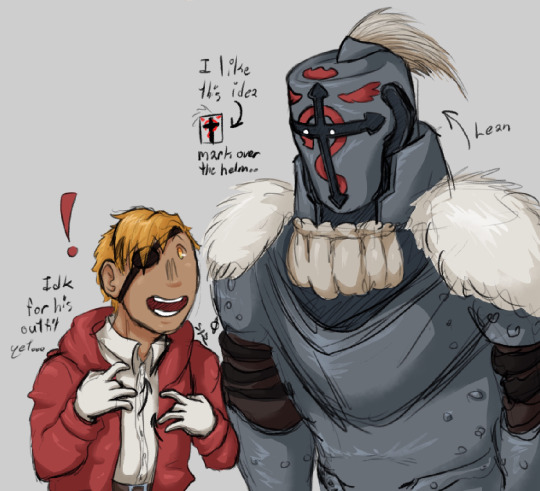
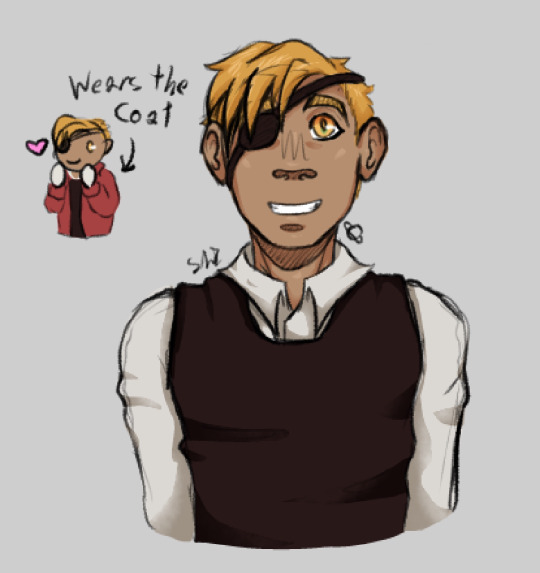
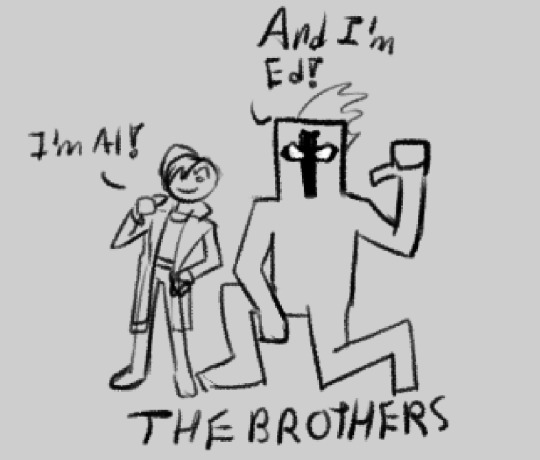
Accidently cooked up a silly little au the other day that I am very much enjoying
gonna. talk about it under the cut because4 the FUCKING WORMS
OKAY so basically. literally everythign is the same except for the fact that. Ed got entirely yoinked instead of Alphonse. I dunno why that happens but. It does because I say so. Anyways. So this basically mean that Ed gets bonded to an armor instead of Al, and because I desperately wanted the secondary set of Armor to see some light I thought it would be funny to bond Ed to that instead.
I haven't fleshed everything out, but as I'm working on that I wanna add a few of the different things in here just because. And I still might tweak things if I think it doesn't make sense.
- Al lost his arm first, then traded his tongue and his eye to bond Ed to the armor, making him effectively mute. He's learned ASL and Ed has to translate for him a lot. Although in my hcs Al is a foodie so like. major bummer for taste buds. He likes fun textures and stuff though. I gotta figure out what problems this poses though so we'll figure that out.
- Al most likely is going to go into being a state alchemist just for the fact of staying somewhat close to the storyline and stuff. and I don't know, insert random reasoning in here. Yeah
- just a little design note. uhmmmmm I thought the cross thing on Ed's head/helm was cool and I had the bright idea of like "hey what if I put the emblem like. through the cross yk" and I might not do that. But at the moment it looks cool to me. so yeah.
I'M STILL TOYING WITH THINGS. . . I have to figure out what happens and designs and stuff. but yeah. I think that covers. what I have for now. p sick. scuttles away
#uhmmm. fuck I'm not entirely sure which things to tag bc I've been referencing the manga for a lot of this. but fuck it we ball#fmab#fma brotherhood#fma manga#fma#fullmetal alchemist#fullmetal alchemist brotherhood#fma au#alphonse elric#edward elric#yeah lets go with that#Spenxer Lou Art#lou is an artist#Honestly this is. kinda like a role swap a little but. But not entirely. and probably not too original but I'm having fun#Anyways. I have to say that the first time I realized there were two sets of armor#It literally never left my mind I've been constantly wondering like what would happen if al was put in the other one idk#But then I accidentally made this AU in the shower where Ed gets yoinked instead of Al#so then I was like HOLY FUCK I CAN YSE THE EXTRA SET OF ARMOR#which. holy fucking hell. I've literally have two single fucking panels to reference from. which is hell. but I fucking love it#anyways. uhm. yeah teehee
167 notes
·
View notes
Text
OKAY! Chatot rant in tags below! Read at your own discretion.
#okay starting from the beginning of where ppl usually dislike him. apple woods chapter.#he doesn’t give hero/partner the CHANCE to explain themselves despite them being relatively good recruits up until that point.#and that legit might be my only gripe with that chapter bc!!! stories need conflict! I LIKE the conflict in apple woods!!!#hero and partner being punished so something they didn’t do!#the misunderstanding! how team skull (Skuntank) actually outplays the main duo with a clever yet rotten trick. I LOVE that it segways into-#one of the more sweeter scenes of guild members looking out for eachother. I LIKE APPLE WOODS CONFLICT.#but chatot just. not giving them a chance. is so dumb.#I’d personally fix this by having a lil montage of hero/partner fucking up on jobs. A LOT. and chatot giving them a pass every time.#and let the perfect apple incident BE the one where he puts his foot down and doesn’t listen to them. bc he’d given them loads of chances.#and doesn’t want to hear any excuse.#but yeah. I legit dont mind him during that chapter except for that really stupid and frustrating moment.#NOW. CHAPTER 17.#UGGGGHHH WHERE DO I BEGIN#Him not believing hero and Partner about Grovyle and the future being in ruin? FINE. ACTUALLY GOOD. BC CHATOT WOULD BE SKEPTIC.#IT FITS HIS CHARACTER!!#BUT WHAT DOES SUCK. IS HIM GOING ‘Dusknoir isn’t the bad guy. he didn’t do anything wrong’#WHEN HE LITERALLY KIDNAPPED HERO AND PARTNER RIGHT I N F R O N T OF HIM.#(NO LITERALLY. HIS CHARACTER IS IN THE FRONT ROW WHEN IT HAPPENED.)#and him. having the GALL to tell hero and partner they must’ve been ‘seeing things’ and downplaying the HELL they went through.#despite them being missing for hours/days. his own guild recruits. and his angry sprite showing up.#like. I think that’s when I genuinely despised him.#that and him going ‘OH I BELIEVED YOU THE WHOLE TIME HEEHOO :)’ shit was so fucking annoying.#just playing it off as a joke the second the guild started to believe hero and partner.#IMAGINE IF HE W A S ACTUALLY TESTING THE GUILD’S TRUST. SHOWCASING HIM AS THE MORE RESPONSIBLE AND RESPECTFUL RIGHT HAND OF THE GUILD.#and yes. Brine cave he saves hero and partner. but at that point I just didn’t care anymore.#he fucked those two over so much. that I didn’t care what ‘valiant’ sacrifice he had.#and he grills Team Skull for what they did OFF SCREEN. they couldn’t even give us THAT.#<<< THAT or him outright saying sorry would’ve been nice. IKIK his ‘actions’ or whatever but.#eughh again this is all imo. I’m not trying to make people hate him or change their mind.#I’ll get into positives in the second post cause I’m running out of tags
81 notes
·
View notes
Text
3 straight hours of drawing and editing through a horrid migraine for a whole THIRTY SECONDS of self-indulgence beyond your wildest dreams. we call this being extremely normal
song is Bernadette by IAMX
#this is for NO ONE but MYSELF!!!! THIS IS FOR ME!!!!!!!!!!!#'clam is this still that moth guy from the cult game' YES IT IS.#YOU WILL JUST HAVE TO TRUST ME ON THAT.#the context ? FUCK you/j /j /j /j#the context will be out whenever this damn fic will be finished. which if I keep getting distracted to do shit like this instead.#well who knows when that will be#i am scheduling this post to go up in the morning but let it be known i finished making it at 3am. and i'm typing this post at 3am.#i'm normal ? yeah. incredibly#clamart#cotl monch#cult of the lamb#yeah sure fuck it I'll put the tags on here even if it'll be severely out of context#i'll be one of 10 whole things in the monch tag it's fine#monch
73 notes
·
View notes
Text
hi yes its 2.30am I cant sleep anyways I drew myself meeting the cod boys the other day and realize i didnt share it here
it was decided from birb polls so first off
Ghost - Hug

and then Price - I get to decide what I want to do with him (I decided to bite him bcuz I can)
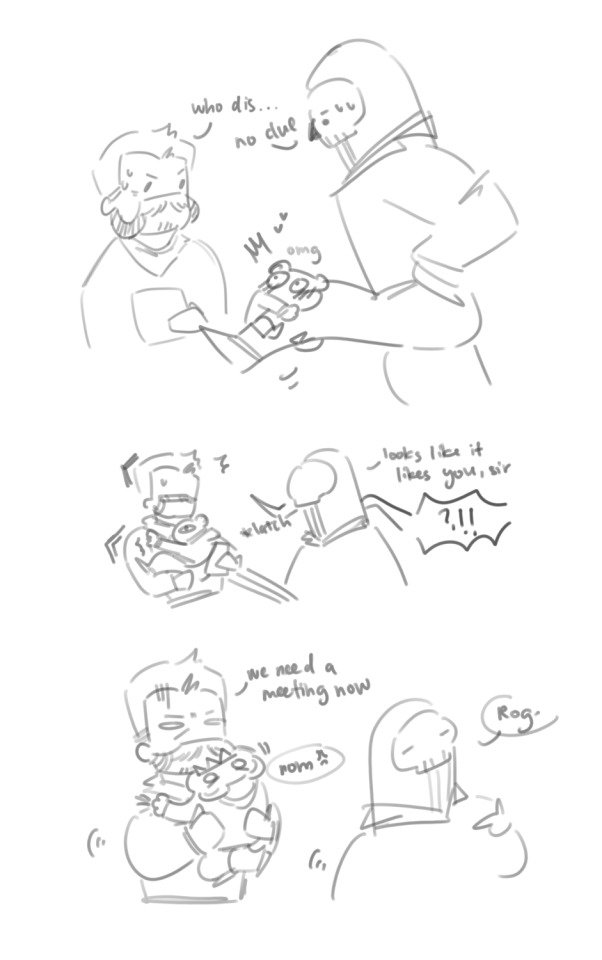
and then Gaz, gave him a kiss

lastly Soap, punch him (I am not sorry)
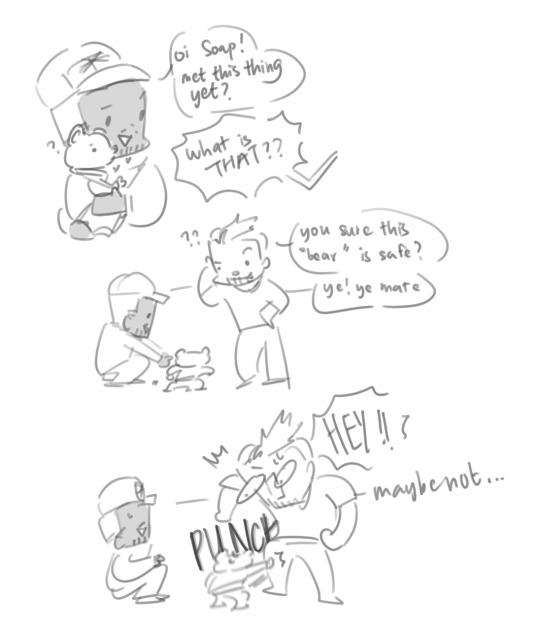
Bonus when the boys got tired of me and want to send me back
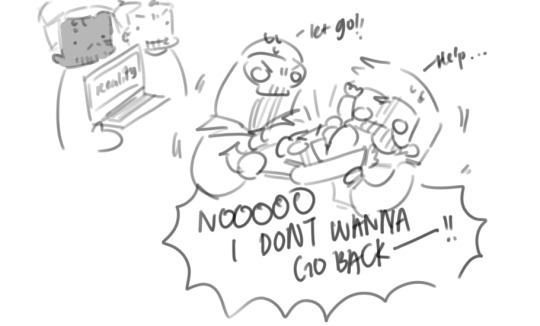
ok i go back eep
#gummmyart#doodle#simon ghost riley#john soap mactavish#captain john price#kyle gaz garrick#how tf do i tag this#<-- the previous tag has become a common occurrence i fear#thats how fucked up my content has become#uhhh#call of duty fanart#and uh#cod mw3 fanart#task force 141#taskforce 141 meets artist#yeah sure that works#you think you put me next to PRICE i will be normal no sir i will not#I WILL NOT LET HIM GO#AND YES THOSE BITES ARE LOVE BITES#he's my hubby he just doesnt know yet#im not sane at all *insert maniacal laughter*#these are nights where I wonder if god gave me too much power for being able to draw#and post it online#and let people see the state im in#oh woah im properly rambling#wait how long can tags go?#do i want to find out?#no i dont#i go eep fr now goodnight#stay hydrated
188 notes
·
View notes
Text
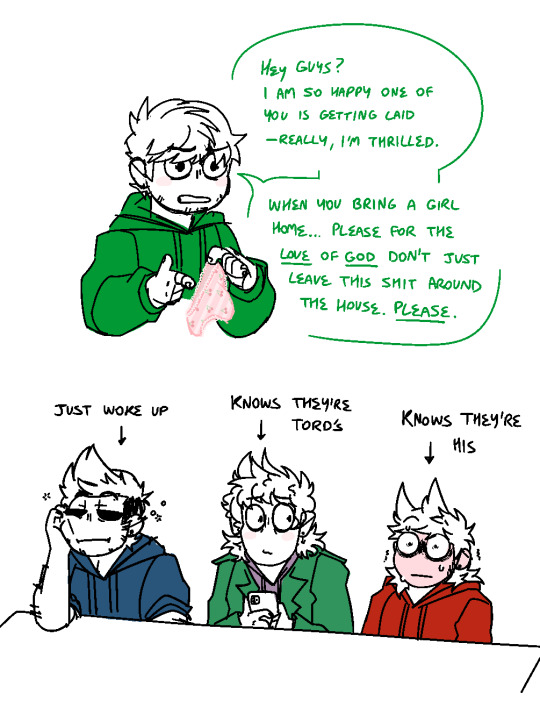
inaccurate it's a gays-only household
MINORS DNI. SINCE YOU ALL CAN'T READ TAGS.
#MINORS DO NOT FUCKING INTERACT WITH THIS POST#eddsworld#yeah ok i'll put this in the main tags#okay to tag as kin#if you tag as me/id for tord i'll give you a little side-eye but i'll let it slide#just this once.#ew tord#ew edd#ew matt#ew tom
759 notes
·
View notes
Note
koi I just saw ur response to my ask :) thank u for the details!!! I can just see the choice conversation going down... but also sy who thinks it's better bc at least here he's alive even if he's ground down to dirt lmao but how do you explain that? that you know the taste of death and that it lingers in your throat? nope, way too deep and inexplicable. but I think that kind of thing would wander in the eyes sometimes, and the hope is always that nobody sees it, but if there's someone who's always looking... sy, stop looking like the devil is touching the back of your neck
ahhh sorry for all that I just really like this au 🥹 I hope I didnt overstep
NO BC YOU ACTUALLY BRING UP SMTH THATS BEEN ON MY MIND.. like one of the big things about this is sy's inner conflict because he despises sqq for having control over his life but at the same time he knows things could have been really worse without sqq's intervention. like if sqq hadn't believed sy then at best he would have sy thrown off the mountain and left to fend for himself, and at worse sqq could have killed him or tried him for an assassination attempt. so its like... its fucked up but sy owes sqq for almost everything, from his position, to the food he eats, to the clothes on his back. sy didnt know there was another transmigrator in this world when he appeared, so up until meeting sqh his survival was due to sqq. and on some fucked up level he feels like he owes sqq for saving him
#sy attendant au#yeah they have a bad relationship. to put it mildly#its like. good in some ways bc it means that sy is able to save lbh from his fate but also like#it means that even if sqq doesnt seem to care about sy a LOT of his attention is focused on sy and how he reacts to things#ask#its also rly funny bc sy is STILL sooo repressed#lqg will be like. are you. ok.#and sy will be like well obviously its fine if i look fine#<- does not look fine#also unrelated but i think its rly funny that lqg has this banter with someone who is supposedly a lottt below his station#bc people will be like arent your positions a little strange to be doing this?#and lqg will be like (sy in his arms#OH THE TAGS GOT FUCKED UP LET ME FINISH THAT#(sy in his arms resting his head on top of him) its fine#svsss
92 notes
·
View notes
Text
AU where, after being defeated by Chai, instead of exploding or whatever, the bosses get so impressed by Chai that they just
Join his side
#Hi-Fi Rush#Hi Fi Rush#HiFi Rush#HFR#Rekka is just#''WOH THERE LITTLE MAN YOU ACTUALLY BEAT ME?? THAT'S IMPRESSIVE I WANNA SEE YOU FIGHT MORE LET ME HELP YOU''#Zanzo joins instantly because he just wants to study Chai#he keeps spouting scientific facts non-stop through 808#Mimosa is like ''fuck yeah dude you sure can put on a show I like you''#dunno for Roquefort tho#Roquefort could be like ''if I join you will you stop slapping me with your scrap metal guitar''#''i'll try'' ''okay then''#I TOLD YOU THE AUs JUST KEEP ON COMING#whoa you can move tags what#anway#toodles
206 notes
·
View notes
Note
the deweys photos are from this video: https://youtu.be/5xTwJho44ao?si=bPw8MZZ327lCogVZ aren’t they just everything

kissing you and the minnesota wild official media team (with consent) full on the mouth, THANK YOU THIS VIDEO IS EVERYTHING 🥰🥰 i have seen pieces of it before i think (connor petting a shark 🥹) but the entire video start to finish is such a delight, 10/10 would recommend
#i’m so glad i saw this now and not when i was deranged at 2AM last night (i say as if i am not currently deranged)#like i had to physically pause. stop watching the video. to take notes to tell you guys about it i hope you know#holyjost thank u i love u i appreciate u & how u always have the sources 😭#i send out a prayer to the universe (put shit in the tags) & u provide#liv in the replies#holyjost#i love this reaction image btw it is one of my FAVORITES#anyway i was just chilling and then lost it at the ‘brandon just says shit’ part and had to start writing down notes (as follows)#there is SO much. the lore. the fact that brandon lasts two seconds before his shirt comes off everyone else is so bundled#dewey2 immediate “sharks” girl help the two of them on the bean bag together#the boat competition BOLDY’S CONTRACT??? yeah i AM thinking about that in a weird way what kind of contract brandon#also boldy motion sickness girlie he’s so real for that one 😭😭#and brandon talking a big game and then like fuckin. curled into a ball on the beanbag passed out bro i cannot.#LD BONITA? LD BONITA FISH??? So excitedly???? my GOD.#LEAVE THAT POOR FISH ALONE!!!!#oh the shark lore 🥺 dewey baby let me take you to this fantastic thing called an aquarium.#you can pet sharks there!!! i can’t even. i know i’ve seen it and had a breakdown about it before but connor’s hand when he pets the shark#the absolute joy oh my god. connor PLEASE ik u want to touch all the fish… we have sturgeon & sting rays & jellies#brandon praising connor’s attitude 🫡 he is so goal oriented they said the goal is a vibe check and connor studied.#also. save me hot brothers save me#what the fuck is this yeti cup ritual give me a cult au NOW wkdndiwkdi they’re such freaks. i love it. also just drink it bro#VLADDY MENTION THAT’S MY BOY HI BEAUTIFULLLLL#OH THIS WAS THE MIDDSY FIGHT???#awww Freddy (who i never think is a forward??)#connor dewar#brandon duhaime#minnesota wild#for reference!
18 notes
·
View notes
Text
homestuck doodle dump
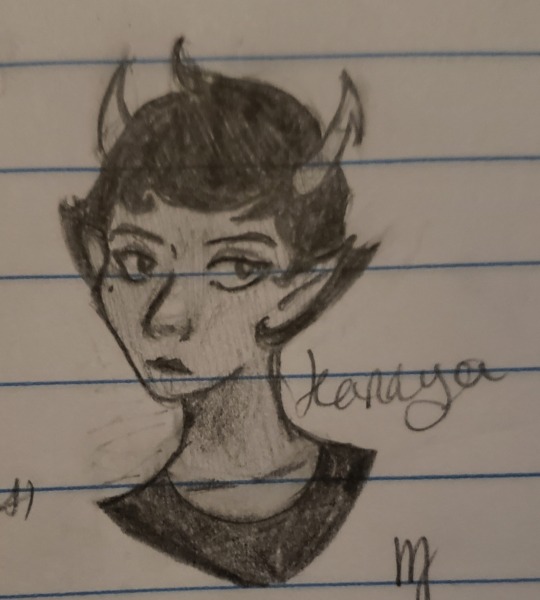

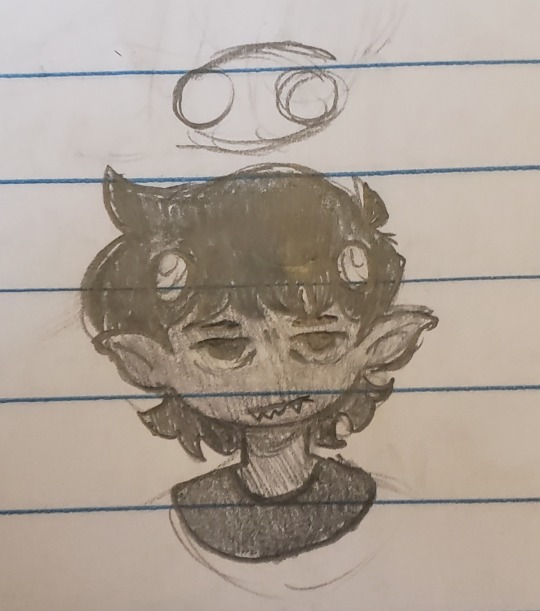
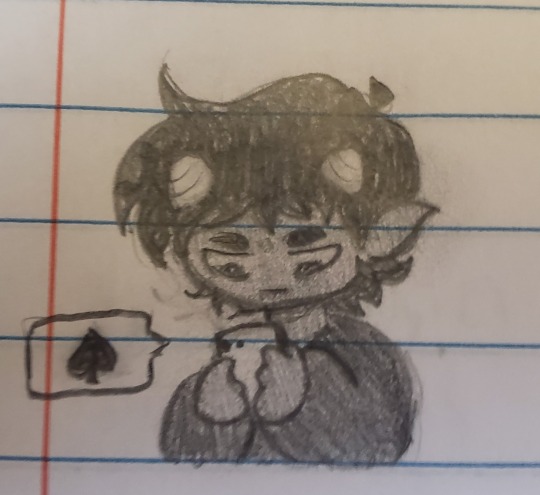
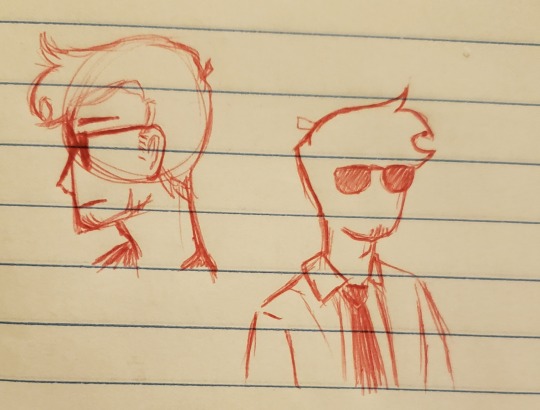
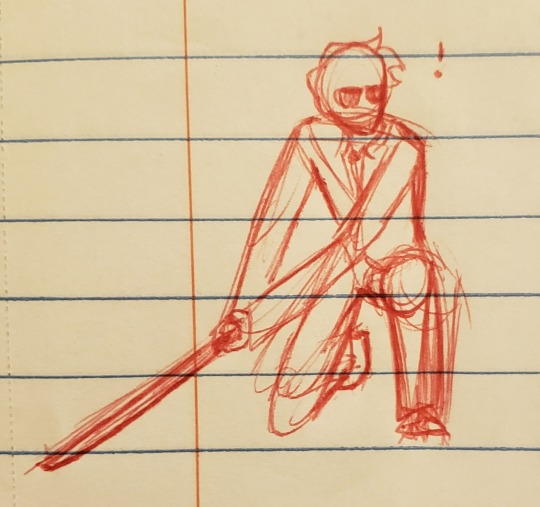
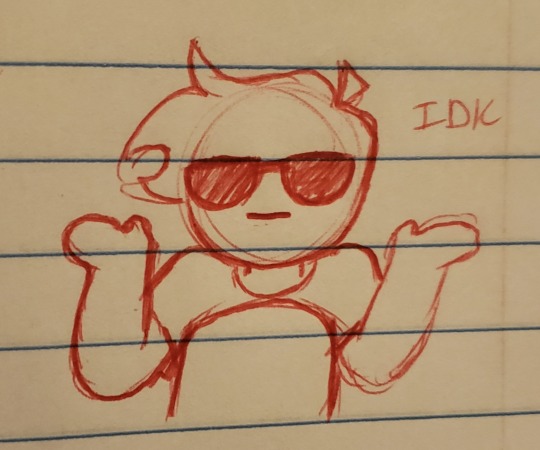
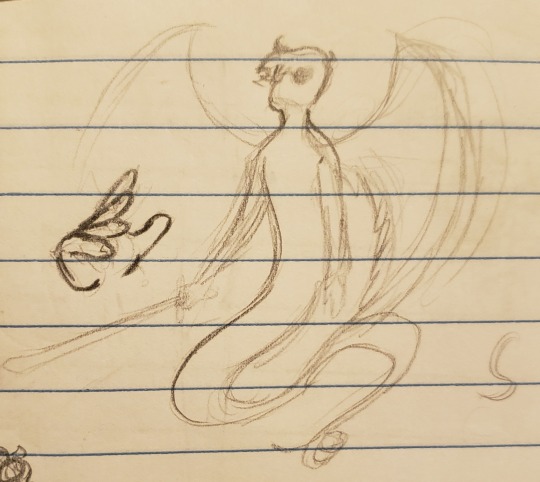

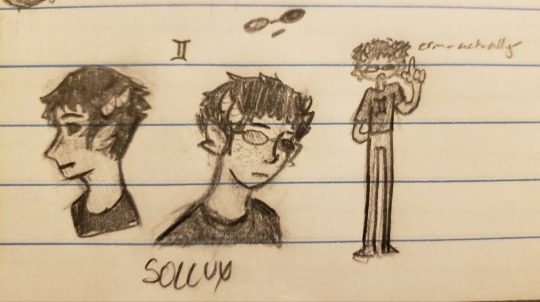
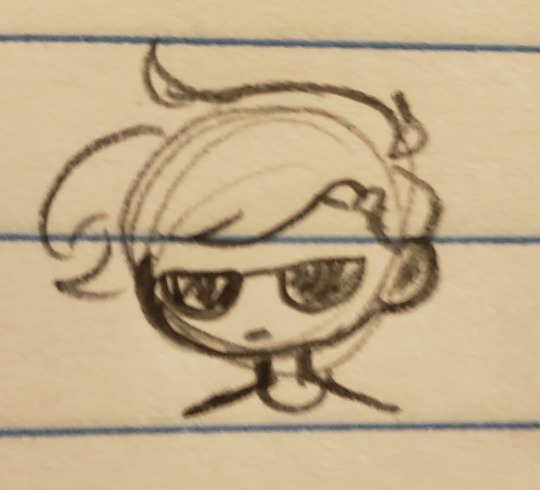
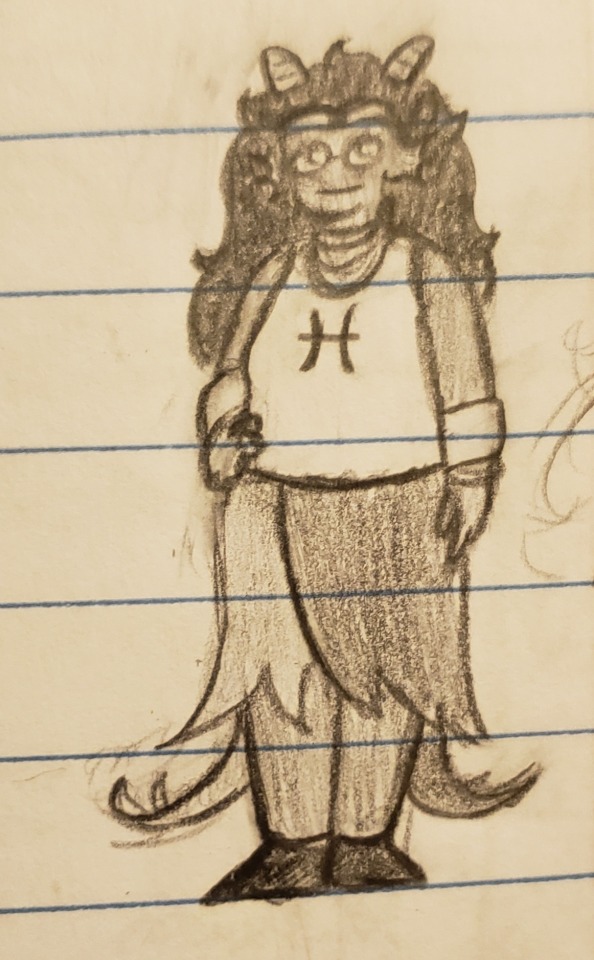
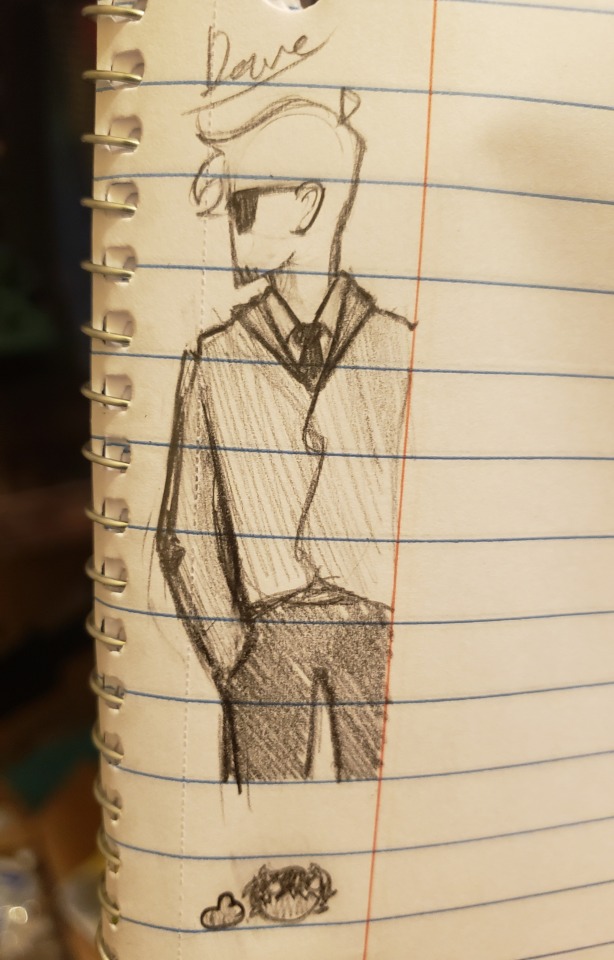
#eugh theyre so silly#omg i just found out that theres a tag limit of 30 per post. like wow i did not know that. so yeah i gotta stop pausing for effect in my#tags and instead start putting everything in these big fucking paragraphs. 😭😭 either that or stop tag rambling but like lets be realistic#here lmao#eugh it looks like so much more now that its in big chunks why do i talk so much 😭😭 what the hell. ok anyways this is my first time#drawing feferi like ever i thinks. pretty cool shes very fun i likes her. i might change my design for her a bit tho. that can be said for#like any hs character tho like just in general. still getting a feel for them dhgsjabaja. but yeah anyways moving onto the actually tags no#my art#doodles#traditional art#fanart#homestuck fanart#homestuck#dave strider#kanaya fanart#gamzee fanart#karkat fanart#feferi fanart#sollux fanart#alpha dave strider#bro strider#omg this is my first time posting my latest kk design. look at that little guy hes so funny.
26 notes
·
View notes
Text
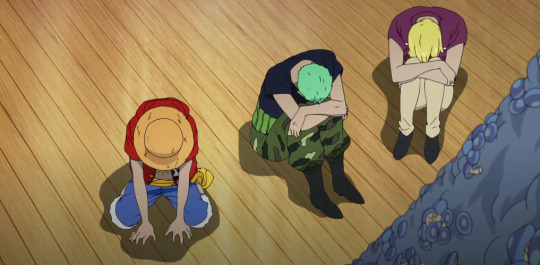
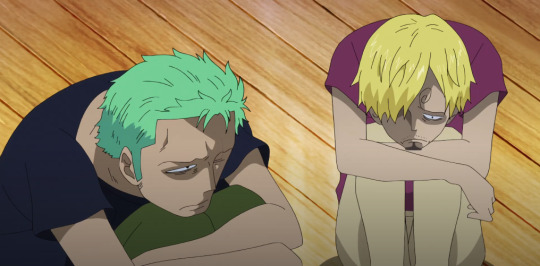
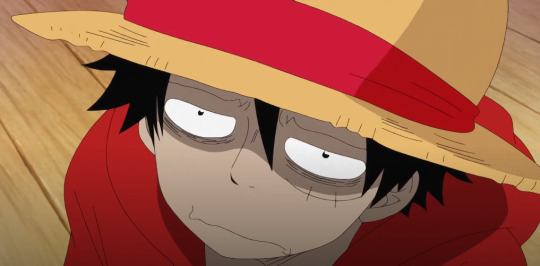
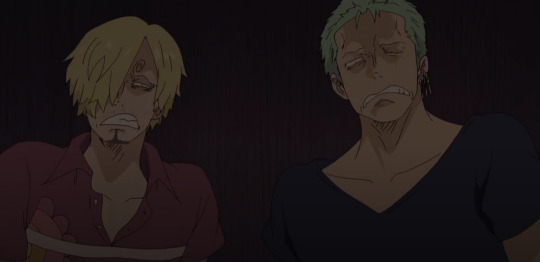
making a collection
making another collection with a threatening aura
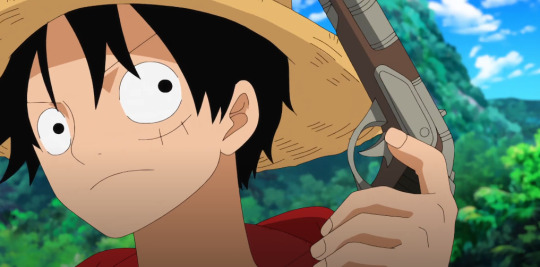

#davy back fightbpart 3 letsgo#HOW do the three big guns get wasted on the eating contest... horrible plan.... luffy is fine bc well... but not sanji and zoro like damn.#luffy DOESNT WANNA EAT??? CALL THE NAVY!!!!#what was i saying.... bad idea putting the three beasts there#FRANKY FRANKY FRANKY!!!! they captured the two princesses :(#one sided beef squashed between luffy and foxy. friendship ended with random ex marine guy. now luffy is my best friend#usopp and franky bonding time hell yeah. throw usopp by the head once more pelase#nami with zoros swords just like holding them looks so cool like she should get a few swords too... nami three sword style oda drawing pls#i think this man underestimates nami and luffys power together he doesnt know about shiki#luffy saying he knows its a trap and sorry for being late.... lets go on an adventure all nine of us.... usopp yes anding his lie..... omg#cant believe nami isnt there yet. she could take this guy. oh there she is!!!!! she does look cool with the swords and jumping to get luffy#zoro screaming in agony from luffy getting shot omg THIS FUCKING GUY OF COURSE!!! this looks like its so over#zoro and sanji must feel so useless rn. they didnt even get the chance to fight like damn#komei-kakka??? more like come caca. boom#luffy face down dead on the floor akdjkaa chopper have you tried looking at the wound to see if it harmed him idk#it hit the face akdjskn usopp that was coom also#was robin flirting with the other guy and zoro caught her and she told hum to shut up???#'your friends got the best of me but you are still in my arms an-' 'HEAT EGG!! ALSO YOU'RE ON FIRE!'#flare maneauver that was so slay also luffy and nami in the same frame so twins of them. my children. birthed them one right after the othe#zoro and sanji fighting back to back. back to back to back to you i dont wanna fall right back to us maybe you should run right back to her#that is such a bop song. also post wano zosan. and post wci. see the recurrent theme#fighting in water.... being on top of the sword that was a slay... red hawk ace i will never forget you it seems#foxy liking his jolly roger omg nami fooled him ahdhsjs i think they should have pirate game event every year they yearn for contests#now since this experience foxy should make monthly multitudinary pirate games olympics hoping the strawhats join them a la gatsby#the faces at the mushroom akdhaksjs#talking tag#watching one piece#watching one piece movies#kinda loved how robin betted on franky against usopp.... i will take the crumbs
22 notes
·
View notes
Text
hhhhhnghm...hear me out...childhood friends with the ragbros...growing up with these two boys with hearts set on adventure, wanting to go and explore the world with them. The both of them. While the three of you play, your parents meet with Diluc's father - the content of their conversations doesn't affect you now. Not immediately at least.
Seashells and pinecones the three of you collected together as children start turning into calla lilies from Kaeya and windwheel asters from Diluc; you cherish both equally and try not to show favoritism...but one bouquet gets the nicer vase. One makes your heart race a little faster. Your parents tell you of their discussions once they believe you'll be able to understand it - a marriage between the two families. You've been promised to Diluc, and when you settle with your thoughts that evening, you find yourself flustered and afraid at the same time. A decision had been made for you before you could even understand what (or more precisely, who) it was you wanted.
A confession goes unspoken the night of Crepus's death; it remains unspoken for years. You spend days with Kaeya, tending to his wounds, trying to get him to say something, anything, about what happened. You spend your nights crying over another undeliverable letter to Diluc, thoughts wandering back to the Dawn Winery standing vacant and cold beyond Mondstadt. How the three of you used to play together there, how you used to plan your journey into the neighboring Liyue, and how those plans will never come to fruition.
You don't expect Kaeya's first words after weeks of silence to be an apology, but you've come to always be surprised by his actions. Whether it's him accompanying you on an evening stroll or working alongside you silently. It stirs something in you; a cocktail of emotions, both infatuation and perhaps something deeper, that you wish you could keep bottled up and hide. But it only pushes back harder each time Kaeya's hand brushes yours, each time he manages to pull a laugh out of you, or returns from another mission unscathed.
You feel light. You feel guilty. You were promised to Diluc, not Kaeya.
And yet that guilt fades for a moment when you hear of the rumors of Diluc's return to Mondstadt. You're not allowed further than the foyer and Adelinde explains it's for the young master's privacy, but you can see the apology in her eyes. You know that she's aware of what you are - what you're supposed to be - to Diluc, but she cannot ignore what she's told. Or what she believes is best. But the rumors are confirmed and your heart hammers against your ribcage: Diluc was back. He was home.
But he's changed. When you do see him, there's no light in his eyes and his smiles (if you could call them that) are cold and closed off. But the more you return to the winery, the more you see there is something there. Something warm and familiar just beneath the icy exterior that brings heat flooding back into your cheeks. It's there in the way he says your name before changing his mind and the way he moves to reach out for you before stopping himself.
But the guilt returns. The weight of your parent's and maid's whispering of your arrangement settling heavily on your shoulders. You were promised to Diluc; raised, primmed, and prepped for a marriage to link yours with the Ragnvindr's and yet you wish Barbatos would strike you where you stood.
How could you love them both so dearly and be forced to choose one?
#toast talks#genshin impacted#this was half stream of consciousness and half fuck it we ball#Been thinking of something like this for awhile#There are also just regular Diluc arranged marriage thoughts#However Kaeya is not pleased that Diluc took up residence just as he was about to get a major update#So yeah I guess you could say this is also extremely self indulgent because I cannot choose between them#Just let me have both yeah?#I would put this in the main tags but again insanely self indulgent and idk if I could write a full fic again
150 notes
·
View notes
Text
not to get into discourse mode on here but the recent shit w/ ao3 being once again called out for being run by racists/genocide supporters and seeing so many fucking Absolute Gormless Shitheads blindly defend OTW and going " dOn'T bRiNg FiCtIoNaL PoLiTicS iNtO tHis!!!111!1 " as if they are not immune to propaganda is wild .
my siblings in sin , ao3 is literally The Racism Fetish Fanfiction site , and propaganda via fictional work is exactly how racism perpetuates. ao3 and the otw are a part of the problem whether you choose to acknowledge it or not because they contribute to the cycle of violence , fetishisation and colonisation of marginalised groups via complacency (and sometimes even blatant PASSIVE ENCOURAGEMENT) , and then they cover it up by using soft cutesy buzzwords like " anti-censorship " and " free speech " and their dumb ass complex tagging system to appeal to white people , so when Actual Minorities and people affected by the shit they put on there speak up about it they're met with all kinds of bullcrap about "jUsT bLoCk ThE tAg If It'S a PrObLem1111!111" or "YoU'rE jUsT bEiNg a fAnDoM cOp!11!!"
You're a part of the problem if you support ao3 and actively continue to use it & donate to them , especially in the wake of the OTW being actively chockful of zionists who will , ironically , silence those who speak up and rally with Palestine for liberation . And If you decide to take this as me being hostile towards you or trying to " bring fiction into real world issues " , remember that at Any point in time you can go on ao3 for yourself and find thousands and thousands of raceplay fics and other various works that glorify and condone racism , and that the otw and their large userbase (primarily composed of white people!) has a track record of trying to shut up POC when this issue is brought to light .
Idgaf if ao3 is for " anti-censorship " , because there's a difference between anti-censorship and HIDING BEHIND the concept of free speech and the 1st amendment to do and say awful , horrendous things and believe you're above critique , punishment or consequences for it .
tl;dr: fuck ao3, fuck the otw, free palestine, and most importantly: you are NOT and will NEVER be immune to propaganda if you choose to ignore it because it benefits you.
#the captain's rambles#ao3#archive of our own#racism cw#free palestine#🍉#otw#ask to tag#also its dumb to request not bringing politics into the topic of ao3#the concept of anti / pro-censorship Is a political statement#anyways. this isnt even touching on the nasty shit ao3 will let you put on their site about Real People (INCLUDING REAL CHILDREN)#mfs be like “you guys are so worried about fictional kids!11!!” yeah cuz if thats what youre willing to write about fictional kids#then how the Fuck am i supposed to trust Your bitch ass with writing about Real Children in a Normal manner#btw ao3 / otw bootlickers who try n come in here and go ERM ACKSHUALLY will be shot at on sight by my rocket launcher#fiction bleeds into reality and can and DOES influence it you dickless jabronies . that's Literally why The Jaws Effect is a phenomenon#and why racist propaganda (like what the IOF spreads) is so effective#you cannot rally against the oppressor and side with them at the same time because “muh fanfic site”#pick a side or get out you spineless fucks#oh and btw. if you try to equate this with just mindless discourse you're incorrect and undermining the larger issue here#which is Literally#otw and ao3 are built off of racist and arguably white supremacist values and THAT is why they fire people --#-- for having the oh so heinous opinion of “hey. racism is Bad.” and allow fics that condone racism and fetishise it on their site.#and post. this has been your once in a lifetime tumblr rant from sonic t hedgehog about why white people in fandom more often than not#fucking suck Butt Ass & absolute Balls#im gonna go shower and get some tuna now
45 notes
·
View notes
Photo
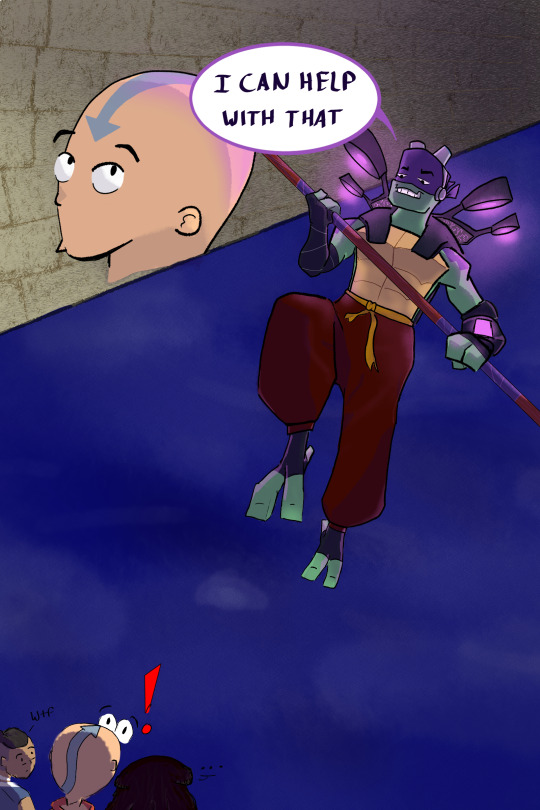
SCENE FROM CHAPTER 6 OF A TALE OF SPIRITS by @unorthodoxx-page.
Check out the fic cause I promise it’s worth your time, my first impressions of it were like “wtf how is this so good?!”
took some time given I’m preparing for college at the moment and way underestimated how my almost 2 year art break affected my digital skills but now that I’m back I’m just PUMPED to get back into it. Might do some other scenes in the future who knows (send recs and I might just be tempted to do other scenes and fics).
Beware they may be simpler than this tho cause wtf even is coloring and backgrounds? Give me my pure sketchy goodness
(segue into my messy sketch. idk man I just like seeing artists being messy and not giving a fuck about ‘clean’ art)
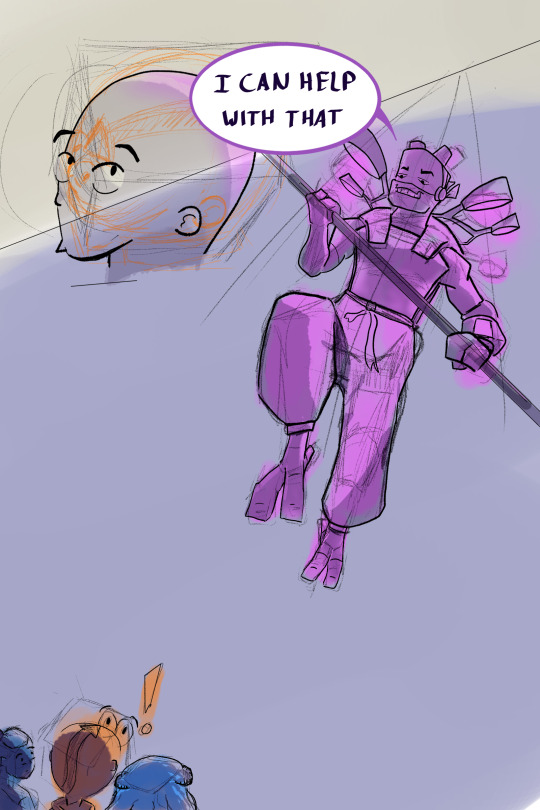
#rottmnt#Rise of the Teenage Mutant Turtles#avatar the last airbender#a tale of spirits#fanfic art#fanart#okay look I know some details are off like the position donnie descends and the fire nation boots/shoes#but look#you seriously telling me those mutant turtle toes of his are fitting in those god awful shoes?#have you seen how fitted those things are? no way jose#I wasn't putting my boy donnie inside those for my first attempt at drawing him#also the arm screen thing is mostly a pre-movie thing I know#I have no excuse for that one I just sketched him based on how he looked in the series since I had more references that way#and halfway through I realised 'wait fuck this is post-movie and movie donnie has those cool black wrappings not this purple stuff'#so I just kinda... colored it black and said it looked good enough? yeah let's just say that in my headcannon donnie got his arm screen back#flawless logic#damn I suck at this tagging stuff#donnie rottmnt#rottmnt donatello#avatar gaang#yeah that ough to do it#welp it's midnight so g'night everybody
165 notes
·
View notes